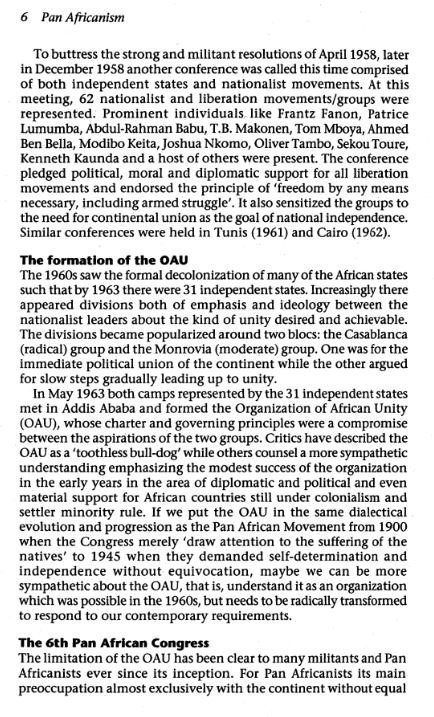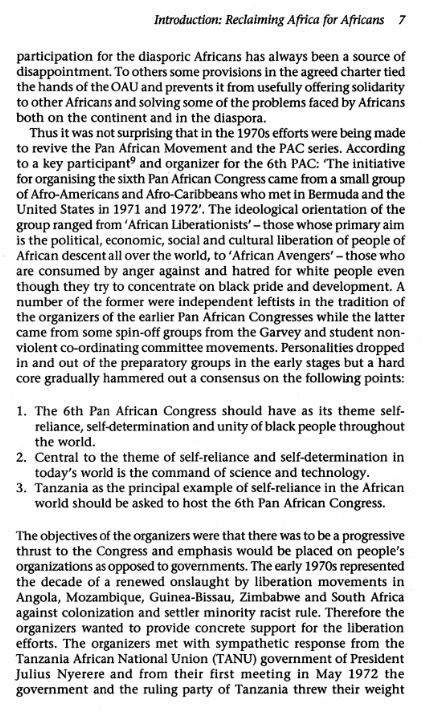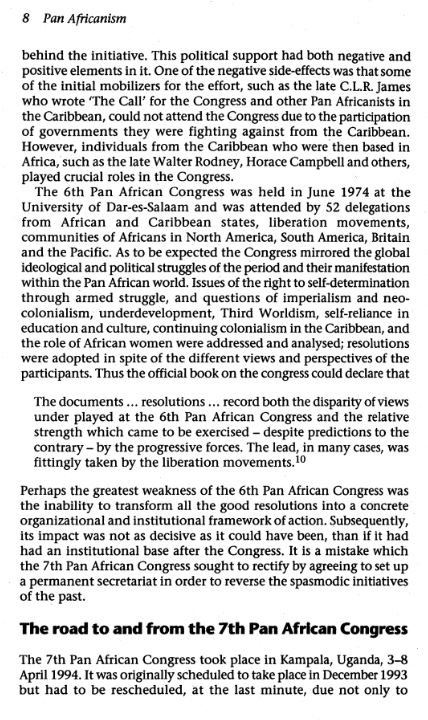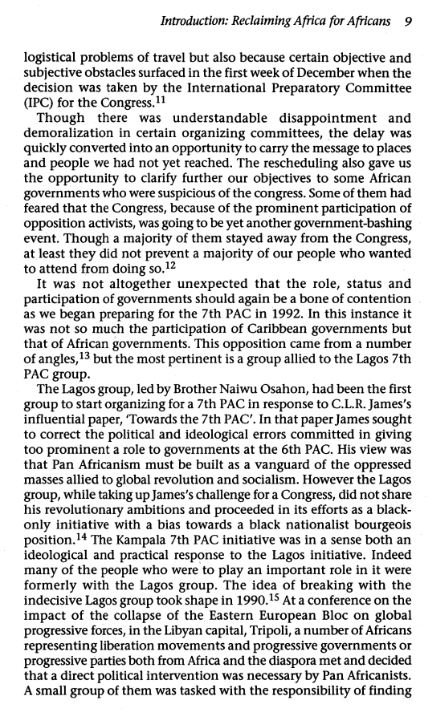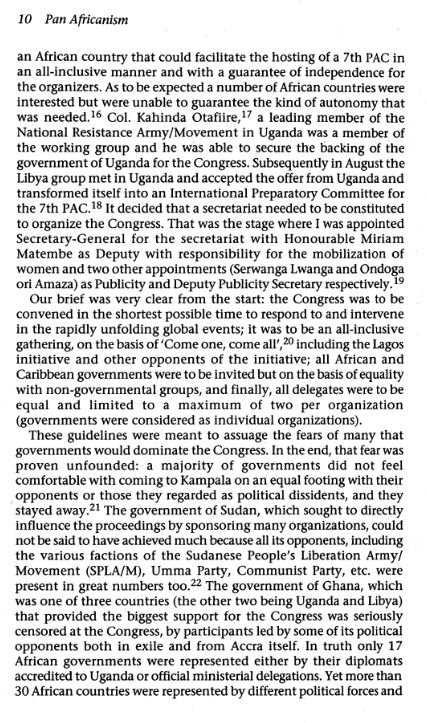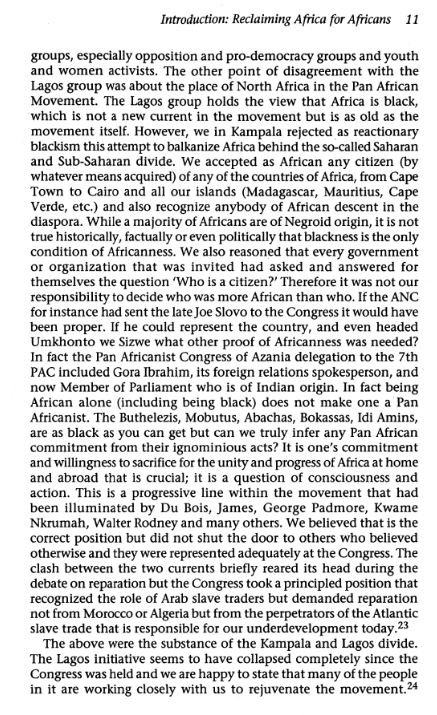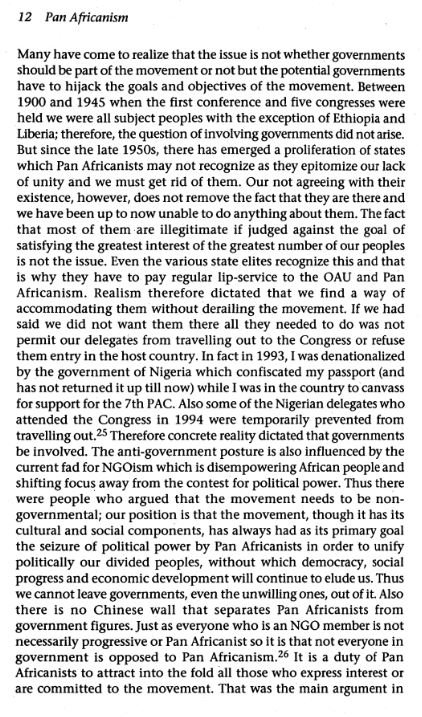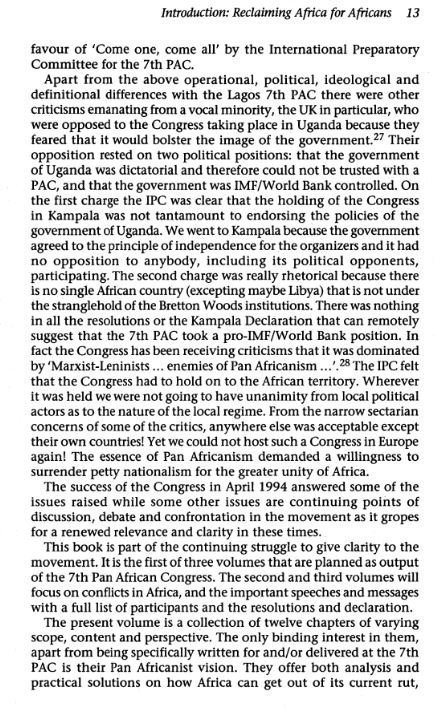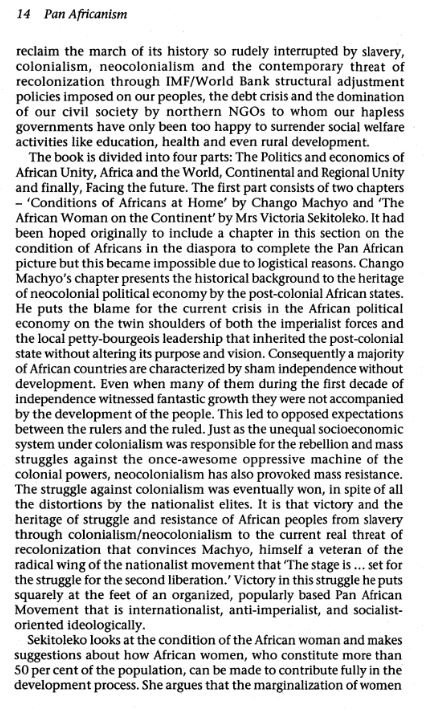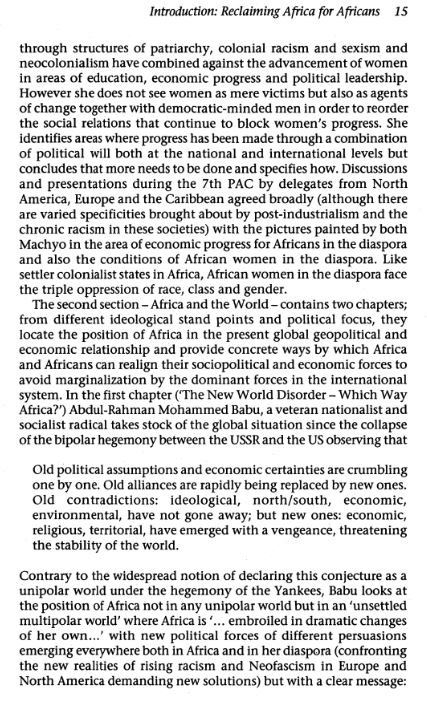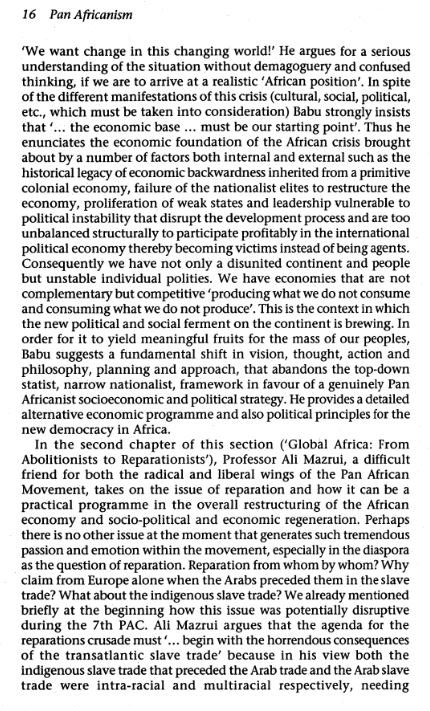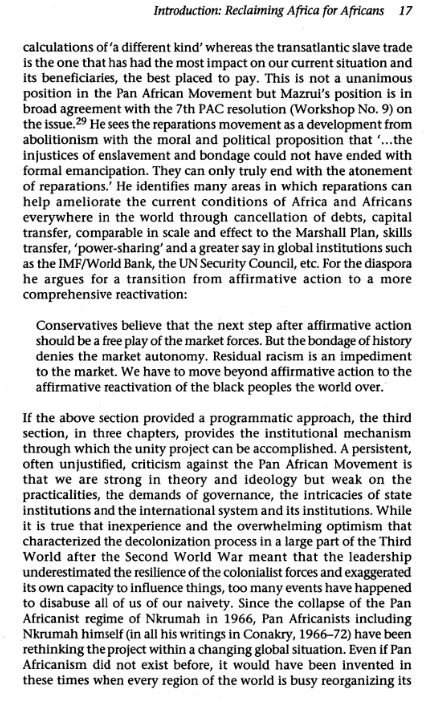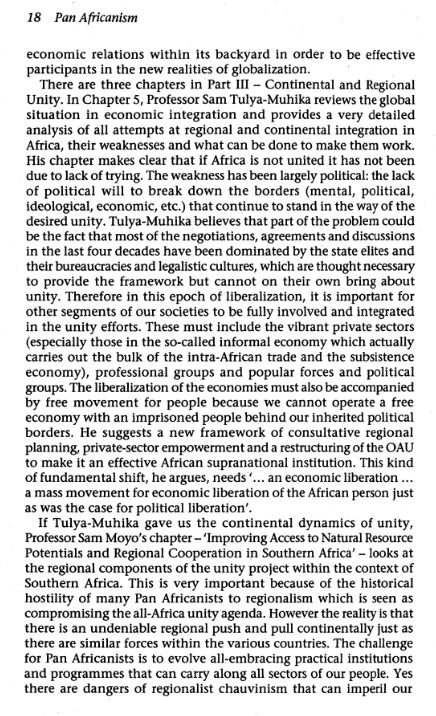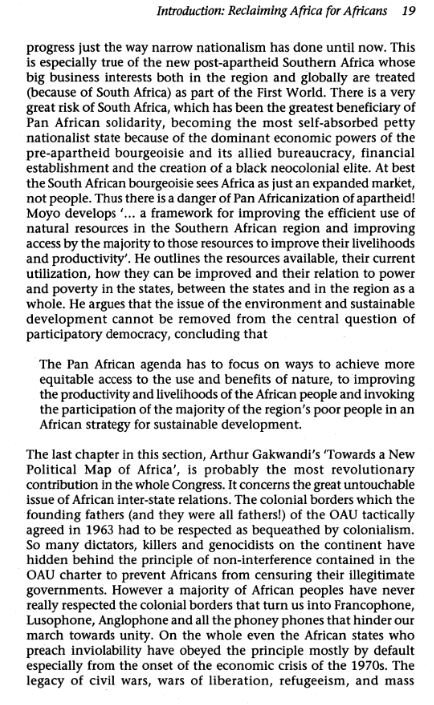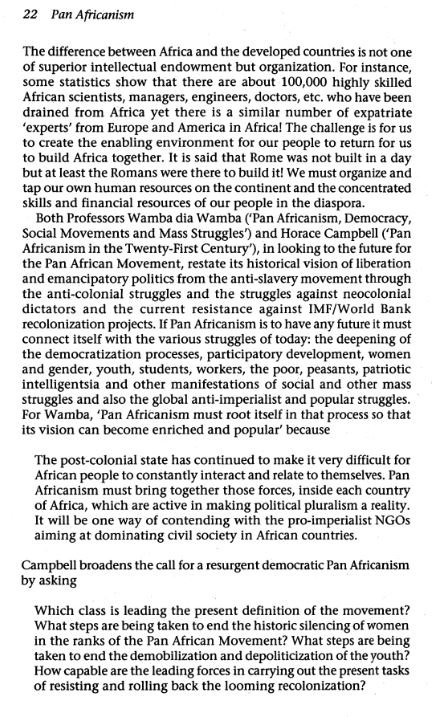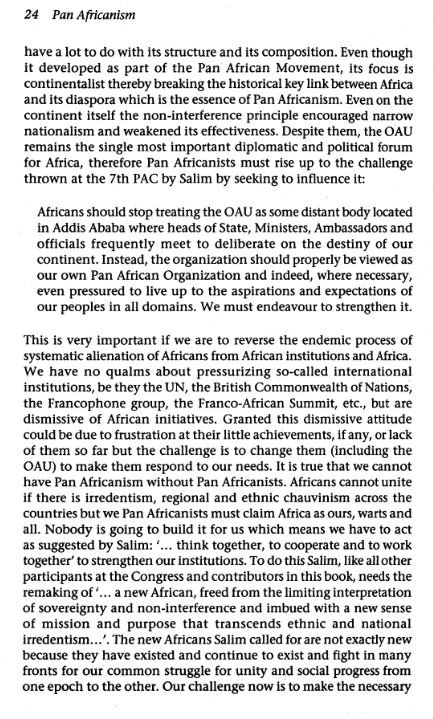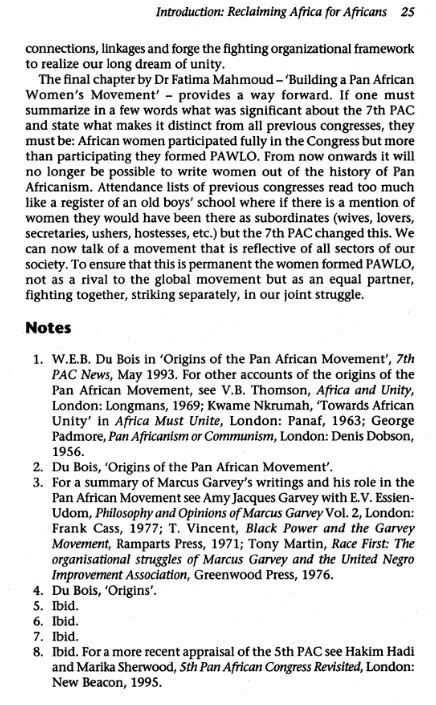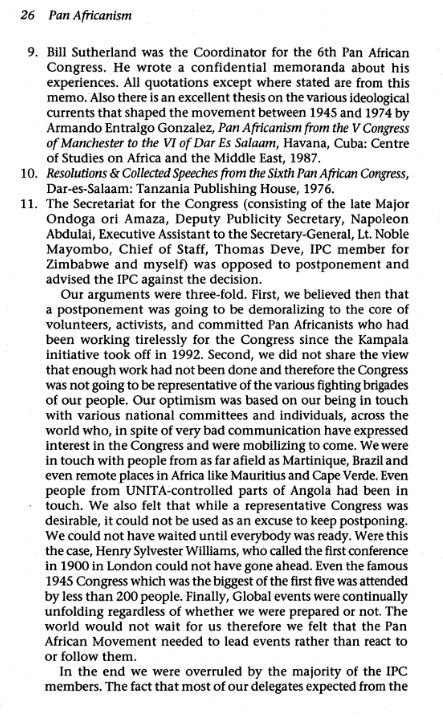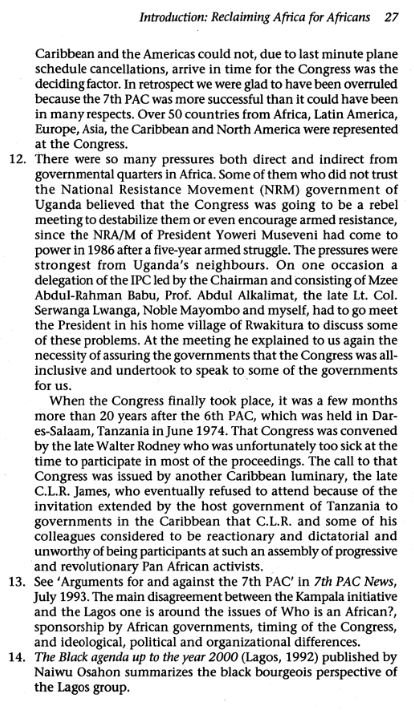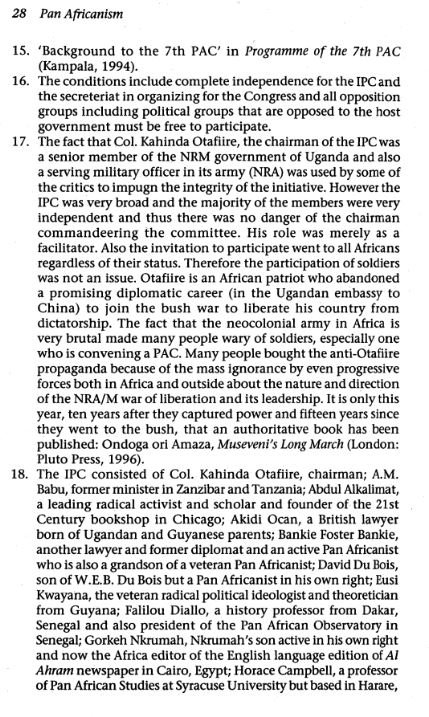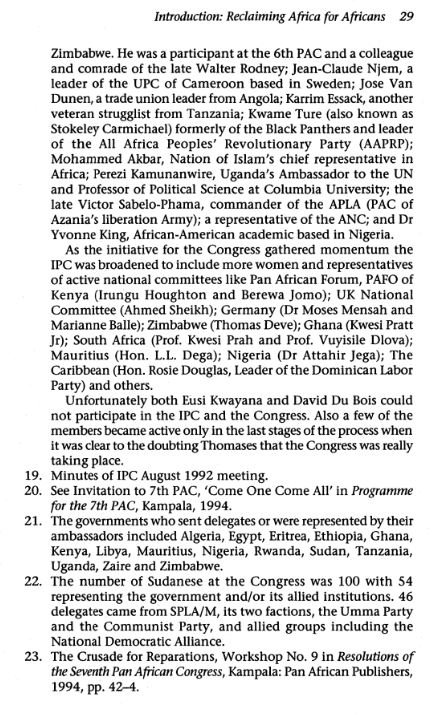“Political conferences of the oppressed invariably attract a variety of responses - varying from cynical conviction that they are an utter waste of time to naïve optimism that they will change the face of the world. In actuality, popular struggle continues from day to day at many different and more profound levels; and its intensity at any given time primarily determines the relevance and utility of the conference as a technique of co-ordination. The Sixth Pan-African Congress scheduled for Dar es Salaam in June, 1974 consciously aims at being heir to a tradition of conferences which grew out of the response of Africans to their oppression in the first half of this century. Therefore, its rationale must be sought though a careful determination of the co-ordinates of the contemporary endeavours of the African people everywhere. . . .
Any 'Pan' concept is an exercise in self-definition by a people, aimed at establishing a broader redefinition of themselves than that which had so far been permitted by those in power. Invariably, however, the exercise is undertaken by a specific social group or class which speaks on behalf of the population as a whole. This is always the case with respect to national movements. Consequently, certain questions must be placed on the agenda: notably, the following:
- Which class leads the national movement?
- How capable is this class of carrying out the historical tasks of national liberation?
- Which are the silent classes on whose behalf 'national' claims are being articulated?”
Walter Rodney, Aspects of the International Class Struggle in Africa, the Caribbean and America
—————————————————————————————————————————————————
As the Coordinator of the Agenda for the Pan African Congress Part 1 (8PAC1) to be held in Harare, Zimbabwe later this year, I feel compelled to follow in Rodney’s footsteps and provide a rationale for the upcoming congress. As I stated in the article From the 8th Pan African Congress in 2014 to the 8th Pan African Congress in 2023, many grassroots Pan African activists are asking questions about the event. There will be some conflict over the Congress’s connection to Ugandan President Yoweri Museveni. There may be arguments over whether or not the Congress should be called the 8th PAC, the 9th PAC or even be called a PAC at all. Some veterans of the Pan African movement may feel slighted that, until now, they were not consulted from the start. And perhaps there may be many more objections.
But Rodney instructs us to make “a careful determination of the co-ordinates of the contemporary endeavours of the African people everywhere. . . .” The original call (June 2022) for the 8PAC1 stated,
“Dear Potential Delegate,
The African Union defines the African Diaspora as all people of African descent living outside of Africa. In 2002 after an increase drumbeat from people of African descent living outside Africa (The African Diaspora), The African Union incorporated the 6th Region as part of the African Union constitution. Since the amendment of the AU constitution, it has been brought to our attention the onus has been left to the African Diaspora to organize and collectively, in a united manner present demands to the African Heads of State as to how we wish to organize and formalize the 6th Region in the same way as the other 5 regions on the continent of Africa.
The Government of Zimbabwe has heard loud and clear the out cry from the African Diaspora and their desire to come back home. As such the President the Republic of Zimbabwe has agreed to host the African Diaspora Pan African Congress (ADPAC) which is scheduled to take place in Victoria Falls, Zimbabwe during the month of October 2022. . . .”
On September 6, the ADPAC was postponed. A letter to potential delegates stated,
“September 06, 2022
To: All delegates to the scheduled 9th Pan African Congress and Invest in Africa Spotlight Zimbabwe Conference . . . .”
Thus, from June to September, the conference changed from the African Diaspora Pan African Congress (ADPAC) to the 9th Pan African Congress (9thPAC). However, sometime between September and February, the event was re-branded the 8th Pan African Congress Part 1. After arriving in Harare, Zimbabwe on February 7th to join H.E. Ambassador Chihombori-Quao’s planning committee, I asked her why the conference was now being called the “8th PAC Part 1"” when it was most recently annouced as the “9th PAC”. Her response was that it was on the insistence of Ugandan President Yoweri Museveni, who intends to host the “8th PAC Part 2” next year in Uganda to commemorate the 30th Anniversary of the 7th PAC that was held in Kampala, Uganda. . . .
What’s important, however, and most relevant to Rodney’s insistance, is that the motivation for the event is that “The Government of Zimbabwe has heard loud and clear the out cry from the African Diaspora and their desire to come back home. “ Given this and the African Diaspora’s obligation “to organize and collectively, in a united manner present demands to the African Heads of State . . . .” it was proper to call the event the African Diaspora (who is meeting) Pan African Congress (concerning an issue that is foundational to all African People and concerning obligations of all AU Member States).
To be sure, the Ghana Tourism Authority predicted its 2019 Year of Return initiative would attract 500,000 extra visitors. Official data from January to September 2019 showed an additional 237,000 visitors - a rise of 45% compared with the same period the previous year. Minister of Tourism Barbara Oteng Gyasi said the Year of Return had injected about $1.9bn (£1.5bn) into the economy. Now, Sierra Leone, Guinea Bissau and other African states are follwoing suit and launching citizenship programs under a “Decade of Return” Initiative. But the Right to Return and citizenship issues has been fraught with problems on all sides.
The right to return and African citizenship issue was initially included in the
WORKING PAPER ON DESIRABLE RESULTS OF THE 6TH PAN AFRICAN CONGRESS, TANZANIA 1974
Since the formation of the African Union, citizenship for African Diasporans has been one of the major priorities that, after twenty years, has yet to materialize. Given that the post Ghana “Year of Return” Blaxit movement represents the largest Back-to-Africa rematriation phenomenon in history since the Dum Diversas War launched in 1452 and the criminal trans-atlantic trafficking of prisoners of war from the African continent, the rationale does indeed satisfy “a careful determination of the co-ordinates of the contemporary endeavours of the African people everywhere. . . .” in the context that African people everywhere want freedom of movement and continental citizenship and that a major catalyst for achieving this is developing a comprehensive African Diaspora citizenship policy.
In Pan-Africanism and Nationality Rights For the Diaspora: A Contemporary Perspective, in Pan-Africanism, African Nationalism: Strengthening the Unity of Africa and its Diaspora edited by B.F. Banke & K. Mchombu, A. Bernard puts it this way:
“The Pan-Africanist Law of Return: Quintessential Reparations
At a very basic level, if reparation is to repair the wrongs committed against African peoples through slavery and its apprentices, colonization and imperialism, the first wrong committed was taking millions of peoples from their homeland. Those taken from Africa lost, among other things, their citizenship and this is the first thing that needs to be given back. It is morally and philosophically the first step in the journey of a thousand miles that needs to be undertaken if Africa and African peoples are to move forward in a forceful, positive and determined manner in the 21st Century.
Concomitant with this position therefore is that the law of return can only be made possible by African governments/states, not the West. It is to be stated clearly nonetheless, that this is a right, not a concession or special privilege. Diasporan repatriates should not have to prove which part of Africa they are from. The loss of this specific identity is a part of the harm done by slavery, and cannot be used by African governments to reject Diasporans. Any African government which challenges the right to return to Africa for proof of specific identity is in breach of their own claim for compensation for slavery.”
Thus, the 8PAC1 is called and organized to fulfill one of the desired outcomes of the 6th PAC. Below is a review of the 6th and 7th PACs from some of our best thinkers involved in them so that the lessons learned are firmly implanted in our consciousness as we head towards the 8PAC1 in Zimbabwe.
6TH PAC INFORMATION OFFICER DISCUSSION WITH C.L.R. JAMES









Aspects of the International Class Struggle
in Africa, the Caribbean and America
BY WALTER RODNEY
(Pan-Africanism: Struggle against Neo-colonialism and Imperialism - Documents of the Sixth Pan-African Congress, Horace Campbell, ed. Toronto: Afro-Carib Publications, 1975, 18-41.)
“Yet, the realities of state power have predetermined that when the Sixth Pan-African Congress meets in Dar-es-Salaam in June 1974 it will be attended mainly by spokesmen of African and Caribbean states which in so many ways represent the negation of Pan-Africanism. One immediate consequence of the rise of constitutionally independent African and West Indian states is that for the first time such a gathering will be held on African soil and will be sponsored, directed and attended mainly by black governments rather than by black intellectuals as such or by small black protest organizations, as was the case up to the Fifth Congress in Manchester. Already it is clear that states will be represented as states and that the OAU will play some role.
When a few individuals began to contemplate this Congress some years ago, it was felt that it should be a coming together of black political movements, as distinct from governments. One school of thought envisaged that it would be a select conference of the most progressive elements in the black world. To a large extent, this was the significance of the All African People's Conference held in Accra in 1958. However, plans for a similar meeting in the 1970s would be hopelessly idealist. The African radicals of 1958 are by and large the incumbents in office today. The radicals of today lead at best an uncomfortable existence within African states, while some languish in prison or in exile. The present petty bourgeois regimes would look with disfavour at any organized programme which purported to be Pan-African without their sanction and participation.
None of the progressive African regimes, which are already isolated and exposed to internal and external reaction, would dare to host a Congress which brought together only those who aggressively urge a unity of the African working masses and the building of a Socialist society. Such a Congress would have to be held in a metropolitan centre, and would thus condemn itself to serve primarily as a forum for alienated intellectuals.
In the light of the above considerations, any African committed to freedom, Socialism and development would need to look long and hard at the political implications of participation in the Sixth Pan-African Congress.”
































Sixth Pan-African Congress: Planning, Preparation and Implementation, 1969 – 1974 By Sylvia I.B. Hill
“Brief Overview of the Sixth Pan-African Congress
Following in the tradition of the previous four conferences from 1919 – 1945, and of the Pan-African leadership from both H. Sylvester Williams, the first architect of the Pan-African Congress, and W.E.B. DuBois, who continued the Congress’ tradition until 1945, members of the Center for Black Education, in consultation with Bermudian Roosevelt Browne (Pauulu Karamarakafego) and Trinidadian revolutionary C. L. R. James, committed to organizing the Sixth Pan-African Congress. [Note: Pauulu Karamarakafego was my roommate at the Central African Black Organizations (CABO) XIIth Assembly in La Ceiba, Honduras in 2006]
After considerable planning with varying participants, serious planning for 6PAC began in 1972 in Washington, D.C. A steering committee consisting of Geri Stark Augusto, Edward Brown, Courtland Cox, Charlie Cobb, Jimmy Garrett, and Sylvia Hill began to meet. They also engaged in international travel to identify potential allies as organizers. The International Secretariat office was organized in 1973 in Dar es Salaam, Tanzania, by Courtland Cox as the Secretary-General, Geri Stark Augusto as communication liaison, and Edi Wilson and Kathryn Flewellen as the administrative support team.
The North America organizing infrastructure was organized regionally including Canada, the Caribbean, and the USA. While logistical organizing was housed in the Institute for African Education (an after-school children’s program administered by Drs. Sylvia Hill and JoAnn Favors at Macalester College in St. Paul, Minn.), Drs. James Turner of Cornell University and Julian Ellison of the Black Economic Research Center (BERC) were the leadership team responsible for hosting political discussions with the various groups opposed to the Congress’ convening.
Seth Markel, historian and international studies professor, captured the priorities of the Congress and the complexity of its proceedings when he observed, “the last section of The Call prioritized ‘complete and absolute’ liberation in southern Africa and the development of a pan-African science and technology center and agenda.” He continued to identify the primacy of the idea of self-reliance, which would mean “the fullest utilization of our own human resources instead of continued dependency on the West.” As Markel observed, fashioning a discussion internal to the delegation would be challenging since the leading personalities were embroiled in a debate on whether race or class predominated an analysis of the problem for Black people in the United States and the world while the declaration of the Congress asserted a class analysis. The listed references offer many interpretations of the Congress’ proceedings and the implications of the declarations.
Solidarity with Southern Africa Liberation Movements
A central agenda item of the Congress was to create an opportunity for liberation movements to build international solidarity with Black people from the different regions of the world to strengthen their cause: to defeat Portuguese colonialism and apartheid in South Africa, Namibia, and Rhodesia (Zimbabwe). By the time of 6PAC, some participants were familiar with the anti-colonial struggles in southern Africa because of the seminal visit of Amilcar Cabral to New York, which was hosted by African-American filmmaker Robert Van Lierop of the Africa Information Service and later published in 1973 as the groundbreaking book, Return to the Source: Selected Speeches of Amilcar Cabral. By 1971, the historic film A Luta Continua, produced, directed, and narrated by Van Lierop was being circulated for showing at college campuses, churches, and social gatherings throughout the USA. The film reinforced the central tenet of FRELIMO, MPLA, SWAPO, and PAIGC: that the national liberation struggle includes the armed struggle phase but most importantly the social reconstruction phase of nation-building in liberated zones. Film viewers grasped the importance of health centers, educational centers for the young, collaborative leadership with equity for women, and collective farming to feed the community. Most importantly, the film showed the elevation of women as partners in the armed struggle with men as well as nation-building activities in the liberated zones. The equality of women in the national liberation struggle was affirmed by posters that showed women with a rifle on their shoulders and children in their arms.
One of the organizational design complexities – with political implications that we did not fully appreciate in our zeal to forge a worldwide Pan-African agenda against imperialism – was the different power and class interests between the liberation movements and African as well as Caribbean nation-states. FRELIMO, ANC, PAIGC, and MPLA focused on asserting the interests of the liberation movements’ political agenda of international solidarity as a primary outcome and objective of the Congress’ agenda. While this was consistent with our agenda as Congress organizers, there were many logistical challenges to making the centrality of the liberation movements a reality in terms of allotted time on the agenda. For example, the Congress had several official languages such as Portuguese, French, Arabic, and Kiswahili that not only created the need for a variety of translators and the reproductions of proceedings daily in the different languages, but it also limited the time for delegate presentations and participant discussions.
FRELIMO, MPLA, and ANC feared that African-American delegates, in particular, would concentrate on the symbols of African cultural solidarity as in clothes, music, and art as opposed to identifying strategies they would wage against U.S. foreign policies in the southern African region. Samora Machel, FRELIMO leader and Mozambique’s first President, said it best when he urged that ‘international solidarity is not an act of charity; it is an act of unity between allies fighting on different terrains toward the same objective.’
Center for Science and Technology
Ronald Walters, an African-American political scientist and leading scholar of the Pan-African movement, observed that “in the prevailing atmosphere, the proposal for a Center for Science and Technology was attacked on the grounds that it represented ‘bourgeois science’ and was improperly understood by the collective delegation of representatives. In any case, this most promising of projects did elicit some useful resolutions concerned with 1) the mobilization of skilled scientific manpower; 2) the development of African natural resources for the benefit of the common heritage; and 3) the extension of health care benefits to the people and the rejection of ill-advised health practices.” Fletcher Robinson, a co-chair of the Science and Technology Committee along with Donald Coleman, captured the sentiments of many scientists when he stated, ‘When we left the conference in 1974, for many of us, it was the most devastating experience of our lives. We participated in an effort that we gave a lot to, over a period of about four years.’ He went on to explain in an interview with Black Books Bulletin that
‘our reception at a formal level was a terrific blow to many of us. We were not accepted in the kinship of Pan-Africanism. There could not be discussion of science and technology in terms of how we could use our expertise and training for African interest wherever we were in the world, because the discussion was entirely politicized. There were people from Arab countries who never allowed the discussion to get on the floor, because they claimed that there could be no serious talk with people who did not represent a country, who only represented themselves.
Not only that, ‘the Arabs also raised the question of why should there be talk about building a science center for science and technology, when Egypt had always welcomed their brothers from the South to their institutions?’ Another important characterization of these challenges by Dr. Robinson was his recollection that ‘this force was joined by people from Guinea, Somalia, and Congo-Brazzaville who said that we were pawns of the imperialists who came to bring forth whatever their doctrine was of imperialism.’ He continued with the observation, “Interestingly enough, when we would talk outside the meeting halls in the ad-hoc groups, then there was a feeling of Pan-Africanism—touching and getting to know each other’s experiences. When we did make our speeches and got a chance to show what we were talking about and why we came there, we got standing ovations.’
Nevertheless, plans for a Science and Technology Center were not adopted. Many local D.C. and national science and technology activists participated in the local planning for the Center such as Drs. Neville Parker and Donald Coleman from the engineering department at Howard University, Drs. Alyce Gulattee and Calvin Sinnette from Howard University Hospital as well as noted Afrocentric psychiatrist, Dr. Frances Cress Welsing.
Women and the Sixth Pan-African Congress
Aside from being the organizational heartbeat of 6PAC, the female participants forged a women-centered agenda during workshops and collective meetings in the after-hours as well as during the formal proceedings. The conference theme, “The role of women in the African liberation struggle” provided an important context for affirming the leadership role of women as delegates discussed with women of the African liberation movements the challenges of assuring girls’ education, women’s health care, and their leadership roles in organizations and societies. There had been a long tradition of USA and Caribbean women of African descent in leadership advocacy role of Pan-Africanism. Women like Amy Jacques Garvey, Queen Mother Moore, and many others were trailblazers for those of us participating in the 6PAC. Geri (Stark) Augusto captured the role of women in the conference when she observed that the position of sisters throughout the African world was discussed and a central part of the agenda.
In her seminal work, “Black Women Organize for the Future of Pan-Africanism: The Sixth Pan-African Congress,” Ashley Farmer noted an important observation that serves as a summary of the significance of the role of 6PAC when she wrote:
‘African-American women activists had always organized within an eye toward Africa. However, events like 6PAC created new opportunities to refine their commitments and Pan-African identities. Through their organizational skills, resolutions, and participation they shaped the direction of twentieth-century Pan-African organizing and the discourse on the intersection of women, gender, and Pan-Africanism.’
Outreach to Local USA Communities
A central objective of the 6PAC Steering Committee was the democratization of the North American delegation, particularly USA participants, that would have an opportunity to travel to Tanzania and participate directly or indirectly in the Congress’ cultural and political activities. Other forces like the traditional leadership of Pan-African and progressive thought, Amiri Baraka, and Owusu Saudaki, felt that only the Pan-African political leadership should attend the conference in order for the African-American view to be presented by intellectual and experiential leadership that would be equal to the nation-state leadership of other participants in the Congress.
Our analysis of social change – and this was particularly emphasized by Courtland Cox – was that in order to build people-to-people solidarity for the Pan-African movement, we needed to create an opportunity for the largest number of non-governmental African-American, Afro-Canadian, Caribbean, and other people of African descent worldwide to visit Tanzania to enhance their knowledge of and solidarity with the African world based on their experiences at 6PAC. Other countries invited and sponsored delegations, so the experiences of many participants went beyond opportunities to build solidarity ties with Tanzanians.
To accommodate the range of North America travelers, the North America Secretary-General organizational team created three categories of participants: delegates; observers, and visitors. A central organizing objective of the Secretariat was to be inclusive by negotiating an affordable airfare and by conducting outreach to women, seniors, young people, unions, community organizations, and professionals as well as within the cultural, religious, academic, and science and technology sectors. While many written and vocal commentaries chided the large number of North Americans, particularly African-Americans, attending the conference as delegates and observers while visiting Tanzania as visitors, there was a pragmatic decision made in the Secretariat that this permitted the lowest airfare and maximized the largest number of participants able to participate while accomplishing our political objective of renewing and building a contemporary constituency for Pan-African activism.
As part of the USA and Canada organizing efforts, participants collected medicines as well as medical supplies and delivered them to the liberation movements as an act of solidarity.
Outreach and Mobilization of Diaspora Communities
Roosevelt Browne (Pauulu Kamarakafego), one of the architects of the 6PAC at the behest of President Kwame Nkrumah traveled throughout the Pacific Islands, Australia, and Europe to mobilize participants to attend the conference. (Later, he coordinated housing and meal availability at the University of Dar es Salaam.) Thus, the Congress had a Pan-African representation including Afro-Europeans, Pacific Islanders from Fiji and New Hebrides (which later became Vanuatu), and Afro-Australians. Caribbean radicals were minimally represented, however, because some Caribbean governments refused to participate if radicals of their country were also permitted to participate. This was a concession that President Nyerere made in the interest of his governmental relations. As a result, Dr. C. L. R. James (interview transcript), one of the original 6PAC organizers, refused to participate in solidarity with the progressives from his region.
The Struggle Continues
By fall 1974, activists and fellow 6PAC organizers Sandra Hill, JoAnn Favors, Kathryn Flewellen, and I relocated to Washington, D.C. to raise public consciousness against U.S. foreign policies in Southern Africa. Our focus on this international Pan African solidarity work stemmed from a statement by Secretary General Courtland Cox, who said during his closing remarks, “Each of you who has participated in the Sixth Pan African Congress carries with you, as you leave this hall, an historical and political duty to translate your words into struggle.”
Closing Remarks by the Secretary General, Courtland Cox
Hindsight is always better than foresight. In retrospect I am keenly aware of the mistakes made in organizing this Congress. Having just participated in ten days of proceedings, I am also as aware as any one of you of the positive contributions of the meeting itself. I would like to remark first, if you don’t mind, on the positive contributions the Sixth Pan African Congress has made to the African liberation struggle.
As many speakers in this Hall have documented, the imperative of the African World at the time of the Fifth Pan African Congress was an end to colonialism. For that aim people organized and moved, and history remembers the energizing role of the Fifth Pan African Congress in the anti-colonial struggle.
Our world, the world which African people have such dynamic potential to change, has progressed since 1945. I believe this Congress has clearly advocated new imperatives: an end to neo-colonialism and imperialism, and the revolutionary social transformation of African societies and communities.
It remained for energetic people to give life to the call for an end to colonialism after the Manchester Congress. I believe it will remain for energetic people going out from this Congress to prove whether, by speaking against neo-colonialism and for a new social order, we were sowing the wind or planting a crop for liberation. I think it will take a few years to be sure, but we have at least been clear in this meeting about our determination.
Some have questioned all along the validity of calling together a meeting of African people in 1974, given an understanding that peoples of many races and geographies struggle against imperialism, oppression and exploitation. I think this Congress has ratified the validity of African people meeting to chart a political course for our common problems. We as African people still have an obligation to continue our own most important contribution to human advancement — the building of a strong, just Africa, and the forging of a United African People.
That we listened to each other under one roof has been tremendously important. That we exchanged ideas and assessments of problems — even if they were sometimes conflicting ideas — has been positive, because ideological struggle leads to ideological clarity. That those whose analysis has been shaped in the crucibles of different arenas of the struggle have met, argued, discussed, and written is important. I do not know of another forum which has brought together people struggling in Southern Africa, on African Islands elsewhere throughout the continent, with brothers and sisters from Britain, North and South America, the Caribbean and the Pacific Islands. As Brother Sadaukai remembered for us from Cabral—it is one thing to be Brothers and Sisters, and another to participate in the long struggle of African people for liberation which makes us comrades, as well. Any meeting which promotes this understanding is worthwhile.
Another positive contribution I believe the Sixth Pan African Congress has made is the introduction of the political use, and I stress political use, of modern science and technology, in the struggle to defeat our enemies and build our world. Again I believe it will be some years before the impact of some of these concepts about science and technology as tools in the liberation of the masses of our people will be fully felt.
There has been an emphasis in this meeting on the liberation struggles in Africa against the last vestiges of colonialism, and there has been a leadership role played by the representations of the liberation movements here. Our emphasis on support for the liberation of Southern Africa has been a reflection of the future course that Pan Africanism must take, and marks the recognition by African people everywhere that Southern Africa is one of our foremost battlegrounds.
I believe the major and most serious shortcoming of this Congress has been that some who should have been here were not. History will, I am sure, take us to task for this. There should have been more people’s movements represented, more women represented, more young people participating. That gap in participation in the Sixth Pan African Congress mirrors very real contradictions at work in the African World.
When, and if, there is a Seventh Pan African Congress, I believe the composition of delegates and the issues for discussion will show the progression of our struggle—for one thing is sure, the movement of African people forward towards total liberation is an irreversible process.
I wish to thank all delegates and guests for your participation, your patience, your understanding — and in the case of several hundred of you, for your blood, given to the blood bank for the Liberation Movements.
The Temporary Secretariat must also take this opportunity to thank TANU, the Afro-Shiraz Party, the University of Dar es Salaam, and the People of Tanzania for hosting the Sixth Pan African Congress. It made all the difference in the world that this Congress could be held on African soil.
I have only one final point to make which will end my closing remarks:
Each of you who has participated in the Sixth Pan African Congress carries with you, as you leave this hall, an historical and political duty to translate your words into struggle.”
The Sixth Pan-African Congress
By Dr. David Horne
“Between June 20 and 29, 1974, the sixth in the series of Pan-African Congress meetings occurred in Dar es Salaam, Tanzania, at the University of Dar es Salaam. The first congress, held in 1900, was organized principally by Trinidadian attorney Henry Sylvester Williams and took place in London. An attendee at that 1900 gathering, W. E. B. Du Bois, then took up the organizing mantle for five succeeding international gatherings to discuss and pass resolutions regarding defeating colonialism, improving African affairs, and emphasizing Africa's relationship with world progress. Called Pan-African Congresses by Du Bois to underscore the intention of passing strong mandates and legislatively influential decisions regarding African people, in 1919, 1921, 1923, 1927, and 1945 these gatherings took place in London, Paris, Brussels, New York, and Manchester, respectively. Intrinsically, these gatherings mainly involved the educational and activist elite among North American, Caribbean, and continental African delegations. The African masses were fervently discussed at all of these meetings, but representatives of the African masses rarely attended.
The Fifth Pan-African Congress, held in 1945, was considered at the time the largest and most consequential, as it spawned the first generation of independent African leadership in a post—World War Il environment, including attendees such as Hastings K. Banda (future first president of Malawi), Kwame Nkrumah (future first prime minister and president of Ghana), Wallace Johnson (future prime minister of a revived Liberia), and Jomo Kenyatta (future first president of Kenya).
The Sixth Pan-African Congress (6PAC), hosted by the newly independent Tanzanian government (representing the practical political union of Tanganyika and the island of Zanzibar), was the first Pan-African Congress held on African soil. The coordinators and organizers of that gathering did so in honor of Du Bois (who had died in 1963 as a citizen of Ghana) and Kwame Nkrumah (who had died in 1972 as copresident of Guinea and as one of the 1963 founders of the Organization of African Unity).
While the six earlier Pan-African gatherings had been relatively small, with none of them attended by more than 200 participants, 6PAC was the largest Pan African gathering in history, hosting more than 1,400 delegates and participants, with 300 attendees from the United States.
The 6PAC was also the first Pan-African Congress that relied on extensive community organizing and made a very serious attempt to involve all elements of African people in discussion—for example, official government representatives, academic intellectuals, then-existing African national liberation movements, students, grassroots folk, and elders. The previous Pan-African Congresses had generally been elite affairs, organized by, promoted to, and participated in by intellectual activists, writers, and those who would traditionally have been called the intellectual bourgeois and the petit bourgeois. Participants had to be able to afford international travel.
The previous Pan-African Congresses decried European colonization, imperialistic exploitation, and racism in resolutions, speeches, and manifestos. By the fifth conference, the call for African independence and Pan-African territorial unification had entered the top of the conversation. The 6PAC focused on finishing the movement toward African national independence (within the borders established by colonialism) and achieving economic viability. This sixth gathering was also about trying to achieve consensus on the best way forward for African states and how to more fully incorporate diaspora support in that effort. The older arguments on whether Pan-Africanism meant a collective union of all African states under some brand of scientific socialism (the earlier argument of the Casablanca group, Ghana, Guinea, Mali, Morocco, Libya, Algeria, and Egypt) or a racially focused coalescing of mainly sub-Saharan states into a Pan-African grouping that emphasized territorial sovereignty and continued engagement with former colonial powers (the argument of the opposing Monrovia group, including Liberia, Nigeria, Cameroon, Congo-Brazzaville, Ivory Coast, Burkina Faso, Gabon, Madagascar, Senegal, Chad, Ethiopia, Somalia, Sierra Leone, Tunisia, Dahomey, and Congo-Kinshasa) resurfaced in Tanzania with a big bang.
The resulting clamor left the general impression (for audiences that did not attend) that this larger 6AC was a failure in pushing Pan-Africanism forward. This was and is a mistaken impression.
At the Bermuda Black Power Conference of July 1969, Trinidadian scholar C. L. R. James, who had attended and participated in the 1945 congress in Manchester, chaired a political workshop that included a special discussion on Pan-Africanism. His closing remarks contained strong advocacy for the organizing of a new Pan African Congress. According to William Sutherland, who was a leading participant at the conference, there were two more crucial meetings held in Bermuda and in the United States during the following two years, 1970 and 1971, that resolved to reenergize the Pan-African movement in the wake of the early work of the Organization of African Unity and the ongoing African liberation movements. The attending groups of African Americans and Africans from the Caribbean, many of whom were experienced in Civil Rights and Black Power organizing, agreed to produce a Sixth Pan-African Congress that would have as its theme self-reliance, self-determination, and unity of Black people globally and would focus on Black and African progress and competency in science and technology and convince the government of Tanzania, recognized as the most progressive African state at that time, to host the 6PAC. The meeting participants all agreed that the next congress must be held on African soil for maximum credibility.
Professor James, a popular teacher at the Federal City College (later the University of the District of Columbia) and Howard University from 1966 to the mid-1970s, used his academic platform to begin preparing for the new congress. He organized a coordinating group from the principal survivors of the 1945 Manchester congress, including T. Ras Makonnen, Amy Ashwood Garvey (1897— 1969), and Shirley Graham Du Bois (1907— 1977). Their names as public sponsors and supporters provided an early luster to the effort. Additionally, Professor James induced some of his more progressive students to join, including Guyanese Walter Rodney, former Student Nonviolent Coordinating Committee (SNCC) member Courtland Cox, Marvin Holloway, and Bill Sutherland. Based in Washington, D.C., the Provisional Secretariat for a Sixth Pan-African Congress emerged.
The initial organizational plan produced by this Provisional Secretariat called for the creation of regional committees for North America, the Caribbean, South America, and Africa. The addition of European, Asian, and Pacific supporters was to be recognized by the secretariat on a case-by-case basis. In 1972, the secretariat issued its first public call to the Sixth Pan-African Congress, written largely by Professor James, Rodney, and Cox (and edited by Geri Stark). In 1973, it issued a 6PAC briefing paper. Rodney, who had moved to Tanzania and was teaching at the university, produced a provocative and much discussed paper, "Toward the Sixth Pan-African Congress: Aspects of the International Class Struggle in Africa," which was distributed by the secretariat in April 1974. A 1945 speech by W. E. B. Du Bois, "The Pan-African Movement," was also reprinted and distributed by the organizers during early 1974.
Between 1972 and 1973, three large regional meetings for North America—at Kent State University; at the Center for Black Education (CBE) in Washington, D.C.; and in Atlanta, Georgia—were held. One result was the establishment of the Temporary Organizing Committee for a Sixth Pan-African Congress, also headquartered in Washington. Courtland Cox from SNCC and the CBE was elected international secretary-general by acclamation. Sylvia Hill, also from the CBE, was elected secretary-general for North America, and Julian Ellison of Columbia University and the Black Economic Research Center (BERC) was elected associate secretary-general for North America. This trio became the Temporary Secretariat for 6PAC. Professor James Turner of Cornell University later accepted an invitation from this secretariat to head the future North American delegation. At a later North American regional meeting in Atlanta, Cox, Hill, and Ellison were formally elected as permanent officers. Cox, with Geri Stark as information offlcer, then left to establish a 6PAC headquarters in Dar es Salaam.
Official North American delegates to the 6PAC included Amiri Baraka of the Congress of African People, Barbara Britton of BERC, Carroll Clarke of Brooklyn College, David L. Horne from the University of California—Los Angeles, Oba T 'Shaka of San Francisco State University ((the latter two the California western regional coordinators.), Haki Madhubuti of Black Books Bulletin publishers, Julianne Malveaux of the Massachusetts Institute of Technology, Gay McDougall of Yale University, Matthew Meade of Yale, "Queen Mother" Audley Moore, Wentworth Ofuatey-Kodjoe of the City College of New York, and Owusu Sadaukai (Howard Fuller) of Malcolm X Liberation University. On June 9—10 at a final meeting of the delegates at Columbia University, Clarke and Ellison finalized drafts of North American position papers.
The Caribbean and South American Regional Steering Committee elected Eusi Kwayana chairman, with Tim Hector and Maurice Bishop among those selected as delegates in March 1974. However, no official nongovernmental delegation from this region participated in the 6PAC.
Postponed for two weeks, the 6PAC finally opened on June 20, 1974, in Nkrumah Hall at the University of Dar es Salaam. In the first order of business, Nyerere was elected president of the congress. Cox and Aboud Jumbe, the vice president of Tanzania (and president of Zanzibar), conducted the opening plenary session as comasters of ceremonies. They played a recorded message from Ahmed Sékou Touré, the president of Guinea, Scholars presented papers on the three major issues of the congress—politics, science and technology, and economics—the last of which Ellison persuaded the secretariat to add. Samora Machel and Peter Onu, deputy secretary-general of the Organization of African Unity, gave speeches devoted to politics. D. M. Nomvete of the United Nations Economic Commission for Africa, presented an economics paper. The congress proceeded, with daily plenary sessions followed by simultaneous sessions of Committees A, B, and C for political issues, economic development, and African science, technology, education, and culture, respectively.
Accomplishments of the 6PAC
According to Courtland Cox, the three primary objectives of the 6PAC were:
Broaden the African international community's understanding of the issues of achieving and maintaining African independence, including the struggle against apartheid in South Africa, and white settler colonialism in Rhodesia, and to increase the concrete base of support for the African liberation movements;
Discuss ways of decreasing and ending African economic dependency and exploitation, while pushing with examples of self-reliance, increased economic self-sufficiency in production, distribution, development, the application of science and technology, and economic cooperation between African communities;
Agreement on ways to complete the movement toward African political independence, including achieving African political unity, a federation of Caribbean states, bringing the masses into the struggle, and broadening the political cooperation between African states and African communities. (Cox 1974)
Did the 6PAC achieve these objectives? For the most part, yes it did. It certainly demonstrated both the intellectual potential and the political maturity of the North American delegation and led to a cementing of interest and permanent involvement of the Black Power advocates in the United States and Pan-African activism. For example, Sylvia Hill, one of the principal organizers, along with her colleagues Gay McDougall, Judy Claude, and Kathy Flewellen, organized the Southern Africa Support Project (in alliance with Trans-Africa) in the aftermath of the conference and helped to nationalize the antiapartheid struggle in the United States and the Caribbean. Their efforts led to the divestment movement and the yearlong protests in front of the South African embassy to end apartheid. Hill's group also organized Nelson Mandela's post—Robben Island tour in the United States.
The 6PAC also led to the relocation of thousands of African American and Caribbean émigrés to Africa. Leaders such as Tanzania's Julius Nyerere, Uganda's president Idi Amin, and Ethiopia's Haile Selassie put out permanent invitations for such residential transference. A large group of Jamaica Rastafarians settled in Ethiopia on land donated by Emperor Selassie. Additionally, Preston Wilcox, the Harlem activist and Black nationalist friend of Malcolm X, long known for his advocacy of Black community control over schools that educated Black youths, used his involvement in the 6PAC to inspire the cofounding of the National Association of Black Teachers, his involvement in the National Black Power Conference in 1972, and the establishment of AFRAM (acronym for African American), a Black community service agency and multinational library of newspapers, periodicals, magazines, books, and pamphlets. These publications covered progressive events in the African world community. He later donated those items to the Schomburg Center in New York.
Also at the 6PAC, Drs. Fletcher Robinson, Don Coleman, and Neville Parker made a very compelling presentation for the establishment of a Pan-African center for science and technology. That center was to serve all of Africa and be financed by independent African states. Because the idea did not garner enough votes to gain traction, it fell by the wayside. The North American delegation also pumped itself up with daily inspirational speeches at the 6PAC but never could hammer out any agreement on a shared position at the congress. African American delegates were, however, treated to exceptional courtesy by their Tanzanian hosts and were invited to travel to Somalia, Zanzibar, and Uganda (where they were granted symbolic African citizenship).The positive impact on their delegation included a higher level of interest in African affairs. Partially because of the 6PAC, there is still a very large and informed population of African diasporans who became involved in the production of the Seventh Pan African Congress in Uganda in 1994, and remained inspired to help build and develop the major institution of 21st-century Pan Africanism, the African Union.
The 6PAC strongly maintained the energy and impetus toward achieving real Pan-African unity and self-reliance.”
THE 7TH PAN AFRICAN CONGRESS, KAMPALA, UGANDA 1994
Excerpt below from: Pan Africanism: Politics, Economy, and Social Change in the Twenty-First Century by Tajudeen Abdul-Raheem
TAJUDEEN: FROM THE 6TH PAN AFRICAN CONGRESS TO THE 7TH
“According to a key participant and organizer for the 6th PAC: ‘The initiative for organizing the Sixth Pan African Congress came from a small group of Afro-Americans and Afro-Caribbeans who met in Bermuda and the United States in 1971 and 1972.’ The ideological orientation of the group ranged from ‘African Liberationists’ - those whose primary aim is the political, economic, social and cultural liberation of people of African descent all over the world, to ‘African Avengers’ - those who are consumed by anger against and hatred for white people even though they try to concentrate on black pride and development. A number of the former were independent leftists in the tradition of the organizers of the earlier Pan African Congresses while the latter came from some spin-off groups from the Garvey and student non-violent co-ordinating committee movements. Personalities dropped in and out of the preparatory groups in the early stages but a hard core gradually hammered out a consensus on the following poins:
The 6th Pan African Congress should have as its theme self-reliance, self-determination and unity of black people throughout the world.
Central to the theme of self-reliance and self-determination in today’s world is the command of science and technology.
Tanzania as the principal example of self-reliance in the African world should be asked to host the 6th Pan African Congress.
The objectives of the organizers were that there was to be a progressive thrust to the Congress and emphasis would be placed on people’s organizations as opposed to governments. . . . the 6th Pan African Congress was held in June 1974 at the University of Dar-es-Salaam and was attended by 52 delegations from African and Caribbean states, liberation movements, communities of Africans in North America, South America, Britain and the Pacific. As to be expected the Congress mirrored the global ideological and political struggles of the period and their manifestation within within the Pan African world. Issues of the right to self-determination through armed struggle, and questions of imperialism and neo-colonialism, underdevelopment, Third Worldisn, self-reliance in education and culture, continuing colonialism in the Caribbean, and the role of African women were addressed and analysed; resolutions were adopted in spite of the different views and perspectives of the participants. Thus the official book on the congress could declare that
‘the documents. . . resolutions. . . record both the disparity of views under played at the 6th Pan African Congress and the relative strength which came to be exercised - despite predictions to the contrary - by the progressive forces. The lead, in many cases, was fittingly taken by the liberation movements.
Perhaps the greatest weakness of the 6th Pan African Congress was the inability to transform all the good resolutions into a concrete organizational and institutional framework of action. Subsequently, its impact was not as decisive as it could have been, than if it had had an institutional base after the Congress. It is a mistake which the 7th Pan African Congress sought to rectify by agreeing to set up a permanent secretariat in order to reverse the spasmodic initiatives of the past.
The Road to and from the 7th Pan African Congress
The 7th Pan African Congress took place in Kampala, Uganda, 3-8 April 1994. It was originally scheduled to take place in December 1993 but had to be rescheduled, at the last minute, due not only to logistical problems of travel but also because certain objectives and subjective obstacles surfaced in the first weeks of December when the decision was taken by the International Preparatory Committee (IPC) for the Congress.
Though there was understandable disappointment and demoralization in certain organizing committees, the delay was quickly converted into an opportunity to carry the message to places and people we had not yet reached. The rescheduling also gave us the opportunity to clarify further our objectives to some African governments who were suspicious of the congress. Some of them had feared that the Congress, because of the prominent participation of opposition activists, was going to be yet another government-bashing event. Though a majority of them stayed away from the Congress, at least they did not prevent a majority of our people who wanted to attend from doing so.
It was not altogether unexpected that the role, status and participation of governments should again be a bone of contention as we began preparing for the 7th Pac in 1992. In this instance it was not so much the participation of Caribbean governments but that of African governments. This opposition came from a number of angles, but the most pertinent is a group allied to the Lagos 7th PAC group.
The Lagos group, led by Brother Naiwu Osahon, had been the first group to start organizing for a 7th PAC in response to C.L.R. James’s influential paper, ‘Towards the 7th Pac’. In that paper, James sought to correct the political and ideological errors committed in giving too prominent a role to governments at the 6th PAC. His view was that Pan Africanism must be built as a vanguard of the oppressed masses allied to global revolution and socialism. However, the Lagos group, while taking up James’s challenge for a Congress, did not share his revolutionary ambitions and proceeded in its efforts as a black-only initiative with a bias towards a black nationalist bourgeois position. The Kampala 7th PAC initiative was in a sense both an ideological and practical response to the Lagos initiative. Indeed many of the people who were to play an important role in it were formerly with the Lagos group. The idea of breaking with the indecisive Lagos group took shape in 1990. At a conference on the impact of the collapse of the Eastern European Bloc on global progressive forces, in the Libyan capital, Tripoli, a number of Africans representing liberation movements and progressive governments or progressive parties both from Africa and the diaspora met and decided that a direct political intervention was necessary by Pan Africanists. A small group of them was tasked with the responsibility of finding an African country that could facilitate the hosting of a 7th PAC in an all-inclusive manner and with a guarantee of independence for the organizers. As to be expected a number of African countries were interested but were unable to guarantee the kind of autonomy that was needed. Col. Kahinda Otafiire, a leading member of the National Resistance Army/Movement in Uganda was a member of the working group and he was able to secure the backing of the government of Uganda for the Congress. Subsequently in August the Libya group met in Uganda and accepted the offer from Uganda and transformed itself into an International Preparatory Committee for the 7th PAC. It decided that a secretariat needed to be constituted to organize the Congress. That was the stage where I was appointed Secretary-General for the secretariat with Honourable Miriam Matembe as Deputy with responsibility for the mobilization of women and two other appointments (Serwanga Lwanga and Ondoga ori Amaza) as Publicity and Deputy Publicity Secretary respectively.
Our brief was very clear from the start: the Congress was to be convened in the shortest possible time to respond to and intervene in the rapidly unfolding global events: it was to be an all-inclusive gathering, on the basis of ‘Come one, come all’, including the Lagos initiative and other opponents of the initiative; all African and Caribbbean governments were to be invited but on the basis of equality with non-governmental groups, and finally, all delegates were to be equal and limited to a maximum of two per organization (governments were considered as individual organizations).
These guidelines were meant to assuage the fears of many that governments would dominate the Congress. In the end, that fear was proven unfounded:a majority of governments did not feel comfortable with coming to Kampala on an equal footing with their opponents or those they regarded as political dissidents, and they stayed away. . . . In truth only 17 African governments were represented either by their diplomats accredited to Uganda or official ministerial delegations. Yet more than 30 African countries were represented by different political forces and groups, especially opposition and pro-democracy groups and youth and women activists. The other point of disagreement with the Lagos group was about the place of North Africa in the Pan African Movement. The Lagos group holds the view that Africa is black, which is not a new current in the movement but is as old as the movement itself. However, we in Kampala rejected as reactionary blackism this attempt to balkanize Africa behind the so-called Saharan and Sub-Saharan divide. We accepted as African any citizen (by whatever means acquired) of any of the countries of Africa, from Cape Town to Cairo and all our islands (Madagascar, Mauritius, Cape Verde, etc.) and also recognize anybody of African descent in the diaspora. While a majority of Africans are of Negroid origin, it is not true historically, factually or even politically that blackness is the only condition of Africanness. We also reasoned that every government or organization that was invited had asked and answered for themselves the question, ‘Who is a citizen?’ Therefore it was not our responsibility to decide who was more African than who. If the ANC for instance had sent the late Joe Slovo to the Congress it would have been proper. If he could represent the country, and even headed Umkhonto we Sizwe what other proof of Africanness was needed? . . . . We believed that is the correct position but did not shut the door to others who believed otherwise and they were represented adequately at the Congress. The clash between the two currents briefly reared its head during the debate on reparation but the Congress took a principled position that recognized the role of Arab slave traders but demanded reparation not from Morocco or Algeria but from the perpetrators of the Atlantic slave trade that is responsible for our underdevelopment today.
The above were the substance of the Kampala and Lagos divide. The Lagos initiative seems to have collapsed completely since the Congress was held and we are happy to state that many of the people in it are working closely with us to rejuvenate the movement.
Many have come to realize that the issue is not whether governments should be part of the movement or not but the potential governments have to hijack the goals and objectives of the movement. . . . But since the late 1950’s, there has emerged a proliferation of states which Pan Africanists may not recognize as they epitomize our lack of unity and we must get rid of them. Our not agreeing with their existence, however, does not remove the fact that they are there and we have been up to now unable to do anything about them. The fact that most of them are illegitimate if judged against the goal of satisfying the greatest interest of the greatest number of our peoples is not the issue. . . . Realism therefore dictated that we find a way of accomodating them without derailing the movement. . . . If we had said we did not want them there all they needed to do was not permit our delegates from travelling out to the Congress or refuse them entry in the host country. . . . Therefore concrete reality dictated that governments be involved. The anti-government posture is also influenced by the current fad for NGOism which is disempowering African people and shifting focus away from the contest for political power. Thus there were people who argued that the movement needs to be non-governmental; our position is that the movement, though it has its cultural and social components, has always had as its primary goal the seizure of political power by Pan Africanists in order to unify politically our divided peoples, without which democracy, social progress and economic development will continue to elude us. Thus we cannot leave governments, even the unwilling ones, out of it. Also there is no Chinese wall that separates Pan Africanists from government figures. Just as everyone who is an NGO member is not necessarily progressive or Pan Africanist so it is that not everyone in government is opposed to Pan Africanism. It is a duty of Pan Africanists to attract into the fold all those who express interest or are committed to the movement. That was the main argument in favor of “Come one, come all’ by the International Preparatory Committee for the 7th PAC.
Apart from the above operational, political, ideological and definitional differences with the Lagos 7th PAC there were other criticisms emanating from a vocal minority, the UK in particular, who were opposed to the Congress taking place in Uganda because they feared that it would bolster the image of the government. Their opposition rested on two political positions: that the government of Uganda was dictatorial and therefore could not be trusted with a PAC, and that the government was IMF/World Bank controlled. On the first charge the IPC was clear that the holding of the Congress in Kampala was not tantamount to endorsing the policies of the government of Uganda. We went to Kampala because the government agreed to the principle of independence for the organizers and it had no opposition to anybody, including its political opponents, participating. The second charge was really rhetorical because there is no single African country (excepting maybe Libya) that is not under the stranglehold of the Bretton Woods institutions. . . . From the narrow sectarian concerns of some of the critics, anywhere else was acceptable except their own countries! The essence of Pan Africanism demanded a willingness to surrender petty nationalism for the greater unity of Africa.
The success of the Congress in April 1994 answered some of the issues raised while some other issues are continuing points of discussion, debate and confrontation in the movement as it gropes for a renewed relevance and clarity in these times.”
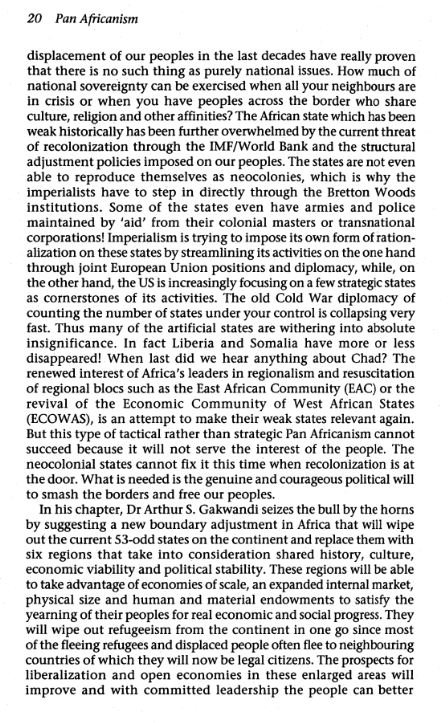
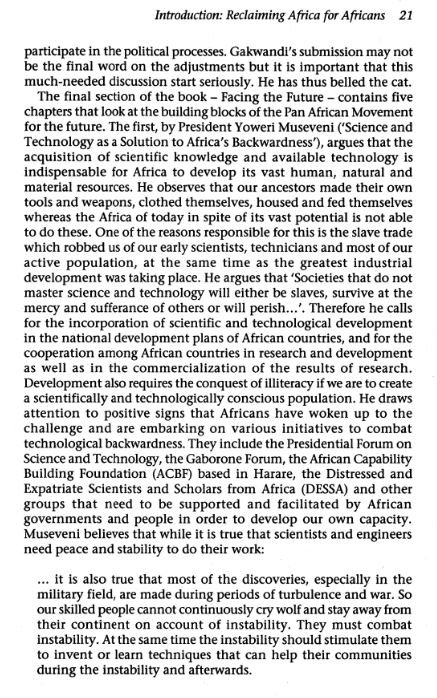
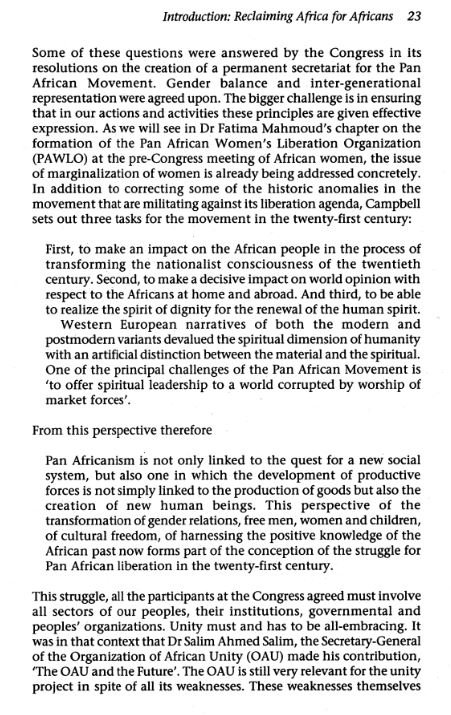
Pan-Africanism: The Tortuous Path Of A Race.
Excerpt by Naiwu Osahon
“The OAU, of course, did not fulfil the ambition of Kwame Nkrumah for a strong political union of all African states, but it opened the Pan-African ideology institutionally to non-Blacks. This is how George Padmore defended the trend at the time: “In our struggle for national freedom, human dignity and social redemption,Pan-Africanism offers an ideological alternative to communism on the one side and tribalism on the other. It rejects both white racialism and Black chauvinism. It stands for racial co-existence on the basis of absoluteequality and respect for human personality." I have no quarrel with all that, but I think we needed to haveasked Uncle Padmore:
(1) Why other races can join our institutions and would not let us join theirs?
(2) Why we are the only race of people in the world striving desperately to tag on to others. We have Black -Arabs, Black Marxists, Black-Muslims, Black-Eskimos and Black -Caucasians. Isn't that saying something forour mentality and self-esteem?
(3) Whether having a union of our own necessarily makes us any more racist than the EU, the Jewish WorldCongress, the Arab League etc?
(4) If our propensity to be seen to be identifying with our oppressors has helped to solve our being the racialunderdogs of the world?
(5) And whether we do not need to tackle our peculiar racial problems first before contributing our wonderful expertise at problem solving to the rest of the world? After all, charity ought to begin at home.
Also, Nkrumah and Padmore needed to have been asked to explain how their pan-continental politics was going to solve the deteriorating problems of the African Diaspora? Forty percent of the Black world do not live in Africa and are, as a result, ignored by the OAU.
The overall success of the 5th Pan African Congress blinded us to some of its not so sound pre-occupations. The 5th PAC set off many half-baked diversionary ideas, which unfortunately led to the failure of the 6th PanAfrican Congress. The conveners of the 6th PAC did not reckon, for instance, with the selfish interest of the newly independent African governments of the time so:
(a) They let government delegations dominate the congress,
(b) Who in turn prevented leading Pan Africanists from participating.
(c) Non-Africans, without obvious commitment to Pan-African ideals, were able to attend as delegates.
(d) The regular negative ideological division between our pseudo socialists and capitalists occupied centre stage.
(e) And, of course, University dons, as usual, were able to use congress to enhance their CVs and show off their borrowed language facilities and richly embroidered dashikis.
And yet, the 6th Pan African Congress succeeded in filling a yearning vacuum and keeping the movementalive, at least, in academic circles, 29 years after the 5th congress. More papers than ever before were submitted or read at the 6th PAC, and a great deal more resolutions were left behind for scholars to pore over till eternity as to their motives etc. The 6th PAC piled considerably more library materials, and gathered more delegates and observers, some 600 of them at one count, than all congresses before it, put together. To the extent that the 6th PAC achieved these feats administratively, therefore, it deserves to be recognized. But did the congress touch the lives of ordinary Africans in the streets? No. Was the 6th PAC any better than the jamborees called first, second, third and fourth congresses? No.
Ask any African in the streets of Europe and America about the 6th PAC and you would draw a blank. Ask any grassroots African on the continent about Pan Africanism today and he would think you are speaking Greek. The 6th PAC has not stopped the continued racial rape and murder of our people in the Diaspora nor has it educated Africans on the continent, sixteen years later, to think beyond the severely circumscribed OAU.
Only the 5th congress was able to make immediate direct impact on our lives with its independence fire sweeping rapidly across colonial Africa soon after the congress. The 5th PAC set the standard by which to measure the success of all future PACs.
The 6th PAC, therefore, was no more than a boring charade and if Pan Africanism is to be saved now, it must be moved beyond the constraining walls of our Ivory Towers, thedeadly hold of our narrow-minded political leaders, and deposited squarely on the laps of virgin grassroots Africans.
These were precisely the sources of my motivation when I began the campaign in 1982, as a private initiative,for the 7th Pan African Congress to convene within three years in a liberated African country. My principal ambition was to use the congress to institutionalize the Pan African Movement and unite the Black world. I was building a farmhouse facility (I called the Monument to African civilization), at Ilogbo-Eremi in the Badagry local government area of Lagos State in Nigeria, at the time, as venue for the 7th Pan-African Congress. The idea was to set up a possible meeting place that would be grand and yet rural in setting and relatively cost free to participants, to avoid recourse to government subvention or sponsorship and, therefore, influence. At the time, I thought that the congress could hold in Nigeria in 1985. A picture of the still being constructed 'Monument' was eventually published in the Guardian newspaper of Nigeria, on Saturday February 4th 1984, with the following caption:
"This is the house Mr. Naiwu Osahon is building. When completed it would be one of the most unique, artistically designed houses ever built anywhere, says Mr. Osahon of the house located on a suburban farmland. Mr. Osahon, ............... on the proposed retreat for local and visiting artistes says: 'Discussions are already being held abroad about holding the next Pan African Congress at the Craft farm house in 1985."
Obstacles, which I considered were mainly responsible for our disunity and lack of focus as a family included:
(1) Foreign religions and ideologies (which in all respects treat us as inferior human beings). These pull us in all sorts of directions to keep us divided despite our being the most marginalized people on the face of the earth already. It is not in the interest of any dominating ideology for victims to unite or have a common focus. Native spirituality serves to bind and encourage claims of ownership and birthright. Religion or spirituality is the greatest mobilizing strategy available to man and we have nothing of our own as a rallying force like Islam is to the Arabs, Judaism to the Jews, Christianity to the Whites or Buddhism to the Asians.
(2) Allowing colonizers, (particularly Arabs who do not consider themselves even remotely as Pan Africanists), to participate in and sponsor our congresses. Arab occupiers of Northern Africa continue to exploit and dominate original African native owners of the land. The war in Sudan is ethnic cleansing against our race and is funded massively by the Arab League through Libya and Saudi Arabia. Arabs have their League but do not want Blacks to have one. We as a race have not been able to focus on how to liberate Northern African Blacks, as we have done against white racists in Southern Africa, because Northern Africa Arabs are equal partners with Blacks in the OAU.
(3) Allowing our 'Movement' to be hijacked by reactionary African political leaders ruining our governments. These are leaders tied to the apron strings of our colonial masters for handouts, which our leaders promptly divert to their individual private accounts abroad for personal gains. They are too busy enriching themselves at our expense to care about our collective welfare.
I strongly believed that while we could excuse the OAU perhaps, to serve the interest of all and sundry as a continental contraption, our 'Movement' cannot afford such a luxury. Not when there is liberation, reparations and repatriation wars still to be fought and won world-wide.
Our Movement must aggressively tackle racism and our marginalization, if we are ever to collectively make progress as a people. And our 'Movement' must remain permanently on the alert thereafter. The best guarantee of this is a civil society controlled 'Movement,' with grassroots Africans from the continent linking with the grassroots Black Diaspora, to wrestle power from our opportunistic political elite controlling our governments. The grassroots Black world need to take their collective destiny into their own hands through an institutionalized 'Movement' that gives equal treatment to both governments and individual delegations. I was implacable over the 7th PAC institutionalizing the Pan African Movement as a vibrant civil society complimentor challenge to the lame-duck OAU.
To keep rancour to the barest minimum at congresses, I insisted that decisions and resolutions of the'Movement' must be fine-tuned and worked out at preparatory conferences and workshops etc., in advance, with congress being used only to endorse. The preparatory activities of the 7th PAC were, therefore, to focus principally on the following three planks:
(a) To agree a body of resolutions and decisions to be known as THE BLACK AGENDA, which could be up-dated now and again at regional and state conferences to become the bible or focus of activities of the Blackrace, including Black governments and individuals.
(b) To chisel out a strong and dynamic CONSTITUTION for the institutionalized 'Movement' welding together, Black governments and Black civil societies in a symbiotic relationship with leadership resting solely in the hands of civil society. The 'Movement' would have to develop a vibrant native spirituality for such a leadership (or moral leadership of the Black race) not to be controversial.
(c) To set up a 'Foundation' to ensure that the 'Movement' or Black League' would never have to beg for financial support from anyone, particularly from extraneous sources. The philosophy of the 'Foundation' (called PANAF at the time), being that every Black person in the world, alive or yet un-born, owes PANAF a hundred units of his or her local currency once in a life-time.
These pre-occupations were embodied in the first set of documents written and distributed lavishly by me around the world from 1982 to announce the convening of the 7th PAC in Africa in 1985.
Responses to my 'CALL' were generally enthusiastic, over the convening of 7th PAC (which was described as overdue), but lukewarm on Nigeria (which at the time was under the jackboot of a vicious military dictatorship), serving as host. C.L.R. James, who was one of the first renowned Pan Africanists at the time to receive our delegation in London, was full of support for an African country hosting the congress. He was not too fussy about the politics of the possible host African government.
However, the series of letters addressed to Babangida, the self-proclaimed Military President of Nigeria at the time, to provide 7th PAC with logistic support in the area of easy visas and adequate security for delegations were ignored. President Dos Santos of Angola wrote us the most inspiring letter of the time, but was sorry he could not play host because of the debilitating civil war in his country. Zimbabwe was more interested in hosting the Commonwealth Heads of State Conference at the time, and Ghana complained of poor financial resources.
While we were still shopping for a possible host country, the Foreign Minister of Nigeria, Professor Bolaji Akinyemi, out of the blue in 1987, announced the Nigerian government's interest in convening the 7th PAC. A failed coup de'tat caused some changes in the Nigerian government with Brigadier Ike Nwanchukwu replacing Prof. Akinyemi as Foreign Affairs Minister. The Brigadier was not interested in the 7th PAC and wanted to know what it meant and its affiliates. Apart from abysmal ignorance about self-history, South African Pan African Congress of Azania (PAC), added to his confusion. However, the earlier announcement of the Nigerian government's interest increased foreign focus on 7th PAC and my efforts, which were independent all along of the Nigerian government's attempted hijack.
The make shift leadership arrangement we had relied upon was formerly structured in 1987 involving a two-tier arrangement with the 7th PAC International Secretariat located in Lagos. The ultimate leadership committee was called the International Co-ordinating Committee (ICC) and had as pioneer members, Professor Kwesi Prah, a Ghanaian working in Kenya at the time, B.F. Bankie, a Ghanaian-Gambian living in London then and Naiwu Osahon, based in Lagos, as the Convener/Chairman.
Reporting to the ICC was the International Steering Committee (ISC), which had as members: Ayi Kwei Armah, Nee Kwati Owoo, Robert Hayfron-Benjamin Beye and Boutros Boutros Ghali.
By January 1989, the ISC had been scrapped due to lack of performance by its members perhaps because ofthe cumbersome two-tier system in operation, and was replaced by an expanded ICC comprising of Naiwu Osahon, Convener/Chairman, Prof. Antonio Neto, Angola, Tau Napata, Jamaica, Prof. Alfred Opubor, Nigeria, Dr. Boutros Boutros Ghali, Egypt (who wrote trying to discourage us from institutionalizing the Pan-African Movement but stayed on as committee member even when he became the Secretary General of the UN), Eunice Neto Foreid, Portugal, Dr. Ona Ekhomu, USA, Prof. H. Cunha Jr. Brazil, H. E. Dr. Henri Bangou, Guadeloupe, Dr. Laura M. Torres Souder, Guam, Amar Bentoumi, Algeria (who later withdrew because of the focus of the 'Movement'), Dr. Joycelyn Loncke, Guyana, Dr. Digna Castaneda Puerta, Cuba, Pauulu Kamarakafego (Roosevelt Brown, now late, who represented us at the UN and was the pioneer sponsor of the 6th PAC, Bermuda, Hon. Mr. Bernard Narokobi, Papua New Guinea's Minister of Justice at the time, Dr. Cyril.E. Griffith, USA, Grace Mera Molisa, Vanuatu, Prof. Mary Frances Berry, USA.
By 1990, we had received several letters of support from the likes of Leopold Sedar Senghor living in France at the time; C.L.R. James, before he died, insisting that the congress must be convened in an African country. The Prime Minister of the Commonwealth of Bahamas; the President of the United Republic of Tanzania; the Minister of Justice of Papua New Guinea; the governments of the Republics of Cote D' Ivoire, Liberia, Togo, Angola, Zaire, Ghana, Guadeloupe Senator in France, Boutros Boutros Ghali as Minister of State for Foreign Affairs in Egypt. We had influenced Chief Abiola of Nigeria sufficiently for him to try to steel our thunder by embarking on a 'Reparations' programme of his own, which was eventually sold to the OAU with our active lobby.
By 1992, we had established national branches or committees of the Pan-African Movement in the following countries; Angola, Australia, Barbados, Belize, Benin Republic, Bermuda, Botswana, Brazil, Cameroon,Canada, Congo, Costa Rica, Cuba, Curacao, Dominica, Equatorial Guinea, Fiji, France, Gambia, Germany-Benelux, Grenada, Guadeloupe, Guam, Guinea, Haiti, Ivory Coast, Jamaica, Kenya, Mexico, Mozambique, Namibia, Niger, Nigeria, Papua New Guinea, Portugal, Senegal, South Africa, St. Kitts, St Lucia, St. Maarten, Surinam, Swaziland, Switzerland, Tanzania, Togo, Trinidad, UK, USA, Zaire, Zimbabwe and several new national representatives were being cultivated.
The UK national branch was the very first committee of the 7thPAC to be set up by Naiwu Osahon. It was launched on the 10th of October 1988 at Flat 69, Schomberg House, Vincent Street, Westminster, London,S.W.1, occupied at the time by Prof. Antonio Neto. Founding members of the UK committee included Neto, Bankie, Babu, Pepukayi, Napata, Gotzmore and Bing who was elected the protem secretary.
We started having problems with London right from its take off because, as things turned out, the branch was dominated by self-declared Marxists. They wanted to take over the leadership of the ICC and move its International Secretariat to London because according to them, communications were easier from there. Besides, they were not comfortable with my anti-Marxism or anti-foreign ideology posture and attempt to institutionalize the 'Movement'. Also my determination to exclude Arabs of Northern Africa from the union was a headache. One of their staunchest supporters at the time was Prof. Kwesi Prah who wrote that: "We can notbind the next generation to an institutionalized 'Movement."
My answers at the time were to ask why that should stop us from trying. And how did other races achieve their institutions and union without some first steps? No answer to these questions ever came from Prah or London, or maybe it came through their gradual withdrawal from our fold to encourage and team up with a Uganda faction that eventually developed. They tried desperately to gain access to our International Secretariat's address list before they finally dropped out of our hold three years after their launch. Our (ICC) impression of them at the time was that they were on an ego trip desperate to etch their names on posterity for convening a Pan African Congress regardless of the quality of the congress.
My criticism of DuBois for bequeathing to us the culture of jamboree congresses appeared also to have alienated some supporters of the intellectual icon, including his son, who took offence and started looking for opportunities to scuttle our efforts. Nkrumah's son too soon became less active on the ICC because his father, along with Padmore were blamed for diluting the spirit of Pan-Africanism with their defence of all comers' congresses that welcomed Arab colonizers and Marxist domination all in one breath.
Preparatory conferences of the 7th PAC around the world included:
(a) Hamilton Bermuda (from July 20 - 22, 1990).
(b) Bridgetown, Barbados (from 21 - 22 September, 1991)
(c) Solidarity with Cuba (Saturday 7th December, 1991, Bridgetown, Barbados).
(d) Port-of Spain, Trinidad (Second regional conference of the Caribbean Pan African Movement (from 27 - 28August 1993).
(e) Savannah, Georgia, USA (from 1 - 3 May, 1992)
(f) Toronto, Canada (where ZAWADI KWAFRICA was launched for the first time in the world by Naiwu Osahon(from June 23 - 27, 1993).
The inaugural meeting of the BLACK THINK TANK (BTT) of the Pan-African Movement, now known as THE THINK TANK OF THE BLACK WORLD (TTB), took place from 1 - 8 August 1992, at ASCON, Topo, Badagry, Lagos, Nigeria. The BTT was attended by: Naiwu Osahon, Chairman, Catherene Acholonu, Nigeria, Denese Bradford, USA, Duane Bradford, USA, Tom Dalgety, Guyana, Viola Davis, Barbados, C.M. Eya-Nchama,Equatorial Guinea, Diane Forte, USA, Malinali Meza Herrera, Mexico, Onwuchekwa Jemie, Nigeria, Owei Lakemfa, Nigeria, Olusegun Maiyegun, Nigeria, Rudy Mattai, USA, Kinja Mulegwa-Migabo, Zaire, T.C Nwosu, Nigeria, Osagie Obayuwana, Nigeria, Yinka Ogunsulire, Nigeria, Yeye Akilimali Funua Olade, Nigeria, Charles C. Roach, Canada, Gbenga Sonuga, Nigeria. Two delegates who could not get to the venue of the BTT, but who had paid to attend were: Joycelene Loncke, Guyana and G. Mawa-Kiese Mawawa, Congo.
The BTT examined the issues: "Why are we so blessed and yet so poor?" "Why are we not benefiting as a people from the civilization we pioneered, and what are we to do to get back on our feet again as one family?" THE BLACK AGENDA is a product of the BTT's deliberations and it lays down the rules to guide the activities of Black governments, individuals, organizations, communities, family units, institutions. The BTT also produced the CONSTITUTION of the Pan African Movement, and approved ZAWADI KWAFRICA (ZA) as the name of the Pan-African Foundation. Zawadi Kwafrica are Swahili words meaning gifts of and from the peopleof Africa.
Members of the ICC in 1993 included: Naiwu Osahon, Chairman, Charles C. Roach, Vice Chair, PauuluKamarakafego, Vice Chair, H. E. Dr. (Senator) Henri Bangou, Guadeloupe, Dr. Thomas Cornell Battle, USA, Gerlin Bean, Jamaica, John Benjamin, Anguilla, Prof. Mary Frances Berry, USA, Farika Birhan, Maroons, Dr.Michael L. Blakey, USA, Duane Bradford, USA, Musa Cham, Gambia, Bobby Clarke, Barbados, Dr. John Henrik Clarke, USA, Tom Dalgety, Guyana, Viola Davis, Barbados, M.K. Dingake, Botswana, Babacar Diop, Senegal, Robert M. Dossou, Rep. du Benin, Noel Dossou-Yovo, Rep. du Benin, Prof. Quince Duncan, Costa Rica, Louise Edimo, Cameroon, C.M. Eya-Nchama, Equatorial Guinea, Januario Garcia Filho, Brazil, EuniceNeto Foreid, Portugal, Dianne Forte, USA, Roderick Francis, Jamaica, Major-General J. N. Garba, President of the UN General Assembly at the time, Dr. Boutros Boutros Ghali, (UN Secretary-General at the time), Siegfried Hazel, Curacao, Malinali Meza Herrera, Mexico, Dr. Byron R. M. Hove, Zimbabwe, Eddie Iroh, UK, Onwuchekwa Jemie, Nigeria, Senator Irvin Stephen Knight, Dominica, Pontiff His Grace Srila Bhakti-Tirtha Swami Krisnapada, USD/USA, Joan Lucas, Belize, Dr. Joycelynne Loncke, Guyana, Dr. F. L.Lwanyantika Masha, Tanzania, Kae Matundu-Tjiparuro, Namibia, G. Mawa-Kiese Mawawa, Grenada, Kinja Mulegwa-Migabo, Zaire, James Mutambirwa, PCR/WCC, Hon. Bernard Narokobi, Papua-New Guinea, Abdiasdo Nascimento, Brazil, Michel Ndoh, Switzerland, Prof. Anthonio Neto, Angola, Felipe Noguera, Trinidad, T.C. Nwosu, Nigeria, Frantz Obas, Haiti, Clement O' Garro, St. Kitts. Prof. Omolara Ogundipe-Leslie, Nigeria, Placide Prosper, St. Lucia, Dr. Digna Castaneda Puertas, Cuba, Mora Araceli Reynoso, Mexico, Omowale Satterwhite, USA, Mr. and Mrs Savane, Senegal, Bania Mahamadou Say, Niger, Dr. Jean Sindab, USA, Ghenga Sonuga, Nigeria, Dr. Laura M. Torres Sounder, Guam, Andre France deSousa, Portugal, Hassan A. Sunmonu, OATUU, Cheikh Tidiane Sy, PANA, Dr. Robert B. Sykes, Australia, Terrel Thomas, Suriname, Charles Pascal Tolno, Rep. du Guinea, Stewart M. Tsela, Swaziland, Siteri V. Tuilovoni, Fiji, Prof. Theo Vincent, Nigeria, Amelia Ventura, Mozambique, Alvin Williams, Bermuda, EmmanuelYork, St. Maarten.
Out of frustration for not finding a suitable host country for 7th PAC, we pursued Uganda, more for President Museveni's Guerilla war credentials than for any recognizable record of achievement in the realm of PanAfricanism. The man would not even tolerate dissent from within let alone from outside Uganda. Museveni's Uganda is in the pockets of the Arabs that are marginalizing our kith and kin in Northern Africa.
Our first letter to Museveni was in January 1990 followed by another in September 1990 and a third one in June 1991, inviting his government to be a possible host of 7th PAC without pre-conditions. At the end of March 1991, a number of documents arrived at our International Secretariat in Lagos from Kwame Ture, stating that Kwame Ture of the All African Peoples Revolutionary Party (AAPRP), Col. Otafiire, the personal assistant tothe Uganda Head of State, and four others, had met in Tripoli, Libya, on December 10, 1990, and decided to constitute themselves into a pre-preparatory committee which is to be enlarged to become the preparatory committee to convene a conference to create a mass Pan African organization.
Among the documents sent was an invitation to Naiwu Osahon to attend a preparatory meeting of their proposed conference in March 1991, in Uganda. Obviously that meeting did not hold because according to another notice from them later, the invitations were sent out too late and got to their destinations well after the March date of the proposed meeting. Three further attempts were made, up to the 27th of January, 1992, to put their preparatory meeting together without success but further documents were sent to the International Secretariat of the 7th PAC in Lagos and addressed as such. The documents specified that they were putting together:
(a) A conference focusing on anti-Zionism and
(b) To be called "All African People's Conference. “
Since the title of their conference was not in conflict with our own, we were not entirely opposed to co-operating with Uganda although we wrote back to say: "While we are not uncomfortable with your anti-Zionistfocus, we also want anti-Arab and anti-West focus for your proposed conference."
On the 7th August, 1991, we received a letter from Col. Otafiire, calling their group, the 7th Pan African Congress Committee, with Col. Otafiire as convener and Chairman, and President Museveni as their Patron, thereby constituting a direct challenge to the International Secretariat of the Pan African Movement in Lagos. On the 7th August, 1991, we addressed a comprehensive letter of our objection and discomfort on the matter to President Museveni. After waiting for a while without response, we wrote on the subject to all ourcommittees around the world. Several activities followed around the world after the Uganda bombshell, culminating in a long awaited first ever meeting between Kwame Ture and me, in my office in Lagos on Saturday 27 March 1993. It was an extremely warm and inspiring meeting lasting nearly four hours from about 4.45 p.m. The Secretary General of the 7th PAC national committee for Nigeria, Dr. Osagie Obayuwana, was in attendance mainly as an observer. Several issues concerning the way forward were discussed and the highlights of our agreement were:
(1) That everything humanly possible should be done to keep us and the Black world united. We felt strongly that our detractors must not be given any comfort on this issue. That we needed to close ranks and give purposeful direction at this critical point in our history otherwise posterity would judge us harshly.
(2) That no African government, not even the OAU, under any disguise, should finance or host the 7th Pan African Congress or any other Pan African Congress. They can participate at congress meetings but as equal partners with the rest of the Black world. Congress definitely does not need the authority of the OAU to hold since the OAU is a child of congress.
(3) That non-Black sources should not finance or host any Pan-African Congress.
(4) That the 7th Pan African Congress should be held in Africa, preferably in a country where:
(a) Blacks would have no problems obtaining visas to attend, because no Black person, for ideological,religious, or any other reason should be prevented from attending or speaking his or her mind freely on anyissue as affects the Black world at the congress.
(b) The lives of delegates and others attending congress would be safe and largely guaranteed.
(5) We did not discuss congress date in details but felt that the December 1993 Uganda date might be too soon considering the enormous task of preparing adequately (especially in area of fund-raising) for a meaningful congress. The August 1994 date proposed by the International Secretariat in Lagos, we felt, was feasible particularly for the launching of the institutionalized 'Movement.'
(6) We felt that there was a strong need to ensure qualitative attendance at congress and agreed that while the mass movement dimension of congress should not be hindered, it is necessary for the movement to be led by recognizable Pan-Africanists. In other words, there is a need to identify and agree on who serious Pan Africanists are right now, around the Black world, and either split congress dates to accommodate them or find ways to ensure that congress direction and decisions are controlled by them. If congress date is to be split, the institutional dimension of congress could be held first, say in August, 1994, as already scheduled, followed immediately by the Pan African leaders congress.
After further consultations on the above issues through correspondence with Kwame Ture and other Blacks of diverse interests world-wide, it was agreed that the Uganda conference slated for December 1993, should be a preparatory one for the 7th PAC of the International Secretariat in Lagos in August 1994. The Uganda team ignored our recommendation and announced that they were going ahead with their December 1993, 7thPAC charade.
With US$300,000 blood money to convene the 7th PAC from Gaddafi, Museveni was not only well fortified to play the devil's advocate, he was poised to launch his personal ambition to become the Emperor of a new Tutsi Hema Empire, annexing Rwanda and mineral rich Zaire (now DRC), under the behest of America. We immediately began circulating a strongly worded message warning the patriotic Black world not to go to Uganda.
On January 3, 1994, we received a phone call in Lagos from one of our deputy leaders, Pauulu Kamarakafegoin Bermuda, informing us that the December 1993 Uganda make-believe congress failed to hold. It was cancelled in the last minute because of the non-arrival of quality delegations. Several ordinary, innocent Blackfolks from the Diaspora, unaware of the high wire politics being perpetrated in the name of Pan-Africanism,and hoping to touch base perhaps for the first time in their lives with mother Africa, were turned back at theKampala airport.
A Uganda team, led by Col. Otafiire then set out on a tour of the Black world to deliver Museveni's invitation and offers of free return travel tickets and free accommodation in Uganda to government delegations and renowned intellectuals, who attend their rescheduled April 1994, 7thPAC. They had to move fast to nullify our pending August 1994, 7th PAC date. They arrived Nigeria on January 5, 1994, to deliver their invitation to the Nigerian government without visiting the 7th PAC International Secretariat.
And yet, no head of state attended the Uganda 7th AC debacle. Not even Nyerere who had received our warning message earlier on and who was the principal host of the 6th PAC in Tanzania would grace Uganda with his presence at least to demonstrate continuity. As predicted, the Uganda exercise turned out to be an attempt to be a convener of congress regardless of the outcome to the Black race.
A lot of bravado prevailed, loads of resolutions were passed, and delegates were feted lavishly be fore returning to their various countries, no better off than they were before the congress. In fact, the average Black person in the world today does not know that the 7th PAC has taken place in his or her name. Another jamboree has passed, one of the many failed attempts that litter our chequered history but Uganda achieved 'a me too.' Uganda succeeded in helping us waste another decade, another generation, while Museveni rides on his high visibility profile to destabilize his neighbouring countries to annex and exploit their mineral resources.
The Uganda 7th PAC set up a Pan-African office in Kampala as a propaganda tool of Museveni's Empire building machinery. That done, his hit man, Paul Kagame, a CIA protégé, with US military school training,brought down a plane carrying the Presidents of Rwanda and Burundi over Rwanda/Burundi and Uganda common border. The Presidents' death launched Rwanda's sack and pogrom, resulting in the death of over half a million Rwandans and the displacement of millions of others. Then they replaced the dreaded Mobutu with Laurent Kabila as President of the DRC. Kabila, a Lumumbist, refused to play along, so Uganda, Burundi and Rwanda occupied the mineral rich regions of the DRC in 1999 with America's technical backing. They massacred over two and a half million Congolese, while looting and plundering the DRC's mineral wealth.
But for the meddlesome intervention of the armies of Angola, Namibia, and Zimbabwe, Emperor Museveni was only a hair's breath away from his dream of usurping what potentially would have been the largest and richest modern Empire in Africa. The failed Emperor apparently had misled the President of South Africa, Nelson Mandela, into appearing to support his ambition because Mandela was waiting on a ship off the coast ofKinshasa at the time, to crown Wamba Dia Wamba, as Laurent Kabila's replacement, and Emperor Museveni's new surrogate in the DRC.
AFRICAN UNION (AU)
The latest version of the African Union concept revived from a totally discredited non-Black source with an OAU's special meeting bankrolled by Muamar Gaddafi in Sirte, Libya, in 1999. Gaddafi, as we all know, is the rascal or Satan behind all the modern civil wars in Africa. From Chad to Liberia to Sierra Leone, Gaddafi had his fingers on the rotten, smelly pie. He financed and trained Museveni's Guerrilla adventure, and he is the leading sustainer of Arab pogrom against Africans in the Sudan right now. After failing to build his, the United States of the Arab world dream, he turned to hapless Africa for relevance in international politics. His interest in the African Union is fiendish and totally opportunistic and was designed to lead to the setting up of the AU's headquarters in Sirte, Libya, with Muamar Gaddafi as the United States of Africa's first President. At first,Gaddafi's dream project was opposed by Presidents Obasanjo of Nigeria and Thabo Mbeki of South Africa. President Obasanjo and Abdoulai Wade of Senegal opposed the Reparations for Slavery and Colonialism strategy of the Black world at the 2001 UN World Conference in South Africa, against Racism. It was no surprise, therefore, that with Wade, Gaddafi and Obasanjo playing key roles in the formation of the AU, a constitution that delivers the AU as a neo-colonial appendage of the West and Arab domination was crafted.
NEPAD
The NEPAD team members went down on their knees to beg the West for a $64 billion handout but instead got $6 billion spread over a period of perhaps 64 years, to make it worthless. Obviously, that is where NEEEPAD comes from. The $6 billion bailout is to enable us continue to beg the West with loads of NEEEPADS bought from them.
The deputy leader of the Pan African Movement, Charles C. Roach, who is based in Canada, described the African leaders begging scene at the 2002 G8 conference in Canada this way:
"There is an amusing photograph of Prime Minister Chretien of Canada sitting astride a kneeling camel on his recent trip to Algeria and five other African countries over the NEPAD issue. The Prime Minister is entreating the camel not to stand up and this is understandable, because the way a camel gets up, unfolding its long legs is a roller-coaster ride for anyone on its back. Symbolically, Chretien was telling the African camel to stay on its knees while he perches on its back."
Earlier in 2002, President Moi of Kenya, said in a speech in Blantyre, Malawi, that Africa was doomed to perpetual poverty and backwardness unless African leaders free themselves of egocentricity. That
"no country in the West had an obligation to baby-sit and spoon-feed independent African nations. African leaders must accept this fact, however unsettling, and rethink about their development strategies."
Recently too, President Yahya Jammeh of the Gambia was reported to have described NEPAD as a charter for beggars. Hear him:
"NEPAD would not work. ....Africa is the richest continent in terms of mineral resources, but because of ignorance, Africa, in economic terms, is the poorest continent, and we Africans are the laughingstock of humanity. We have failed because some of us are agents of the same people we are supposed to fight against. We produce the bulk of the world's raw materials so why are we still poor? Some of us are fighting proxy wars in Africa for the benefit of others. Africa has never colonized anyone. Some people who prolonged apartheid are now waving the flag of democracy and freedom. The African debt is not globalized, it is Africanized."
At a forum in Addis Ababa in March 2002, Prof Shadrack Gutto of South Africa's University of the Witwatersrand was asked why NEPAD was presented first to the G8 before African governments had a chance to discuss it. Mr. Wiseman Nkuhlu, the South African president's special adviser on NEPAD, providedthe not so wise answer at the forum that it is because African governments have been pre-occupied with building the AU. In answer to another question at the forum, Mr. Nkuhlu admitted that consultation with civil society "is not where we would like it."
If the NEEEPAD team, backed by the West to perpetuate our developmental pains, would not consult with even their colleagues in African governments before inflicting the culture of the begging bowl on Africa all over again, does the African civil society have a right to expect a miracle from the AU? Where does that leave the Black Diaspora in the scheme of things? What about 'Reparations' and Repatriation'?
The answer is for African civil society to link up with the Black Diaspora civil society to establish a vibrant, uncompromising institutionalized 'Movement' for the Black world, independent of the AU that is currently dominated by Arab league members. The two priority areas of activities of the institutionalized 'Movement'would be:
(a) to pressurize the AU to produce a Pan-African Passport (PAP) to enable any Black or African,mregardless of nationality, return or visit home (Africa) at will without let or hindrance and
(b) to compel the West and Arabs, by any means necessary, to pay Reparations to the Black world for slavery and colonialism. The modern Pan-African Movement is known as the African Peoples' Union (APU), the counterpoise, conscience and spiritual beacon of the AU, wielding its authority as a pressure group through moral strength and scholarship of the Myk.”
NAIWU OSAHON Hon. Khu Mkuu (Leader) World Pan-African Movement); Ameer Spiritual (Spiritual Prince)of the African race; MSc. (Salford); Dip.M.S; G.I.P.M; Dip.I.A (Liv.); D. Inst. M; G. Inst. M; G.I.W.M; A.M.N.I.M.Poet, Author of the magnum opus: 'The end of knowledge'. One of the world's leading authors of children'sbooks; Awarded; key to the city of Memphis, Tennessee, USA; Honourary Councilmanship, Memphis City































Rebuilding The Pan African Movement, A Report on the 7th Pan African Congress.
“The 7th Pan African Congress benefited from the rich experiences of the African peoples and from the strength and weaknesses of the movement since the period of the Sixth Pan African Congress. Under the theme, "Facing the Future in Unity, Social Progress and Democracy" the Congress brought together over 800 delegates representing Pan African Organisations from Brazil to Botswana. In total there were over 2000 participants in all of the events to mark the Congress: the Women's Pre-congress Meeting, the cultural expressions at the Uganda National Theatre, the African Art Exhibition, the Opening of Africa Freedom Park and the Congress itself. There were three outstanding characteristics of the Congress: (a) the fact that the meeting took place despite the internal and external contradictions of the movement (b) the formation of the Pan African Women's Liberation Organisation and (c) the establishment of a permanent Pan African Secretariat The debates and actions of the Congress signalled a firm commitment to the idea that the Pan African Struggle was "one struggle, many fronts. The objectives of the Congress, as declared in the call, were inter alia to ‘articulate a vision for the 21st century and a programme of action for the Pan African Movement.’ Despite the internal debates within the movement as to the definition of an African and the external pressures whether Africa could afford the meeting, the force of the demand to resist recolonisation dictated that the meeting should take place. . . .There was a wide diversity of views in the conference, and this divergence was reflected both in the character of the resolutions and in the content of the declaration of the Congress. In reality, however, the fact that the Congress was dominated by grassroots organisations meant that the position of the African governments was not the dominant one in the meeting. . . .The exposure of different sections of the Pan African world to the issues and questions of different regions was one of the high points of the meeting. One whole day had been dedicated to sub regional networking with reports in aplenary from different regions. One of the most important aspects of the conference was the country reports. These reports directly addressed the first objective of the conference, that is, to locate the concrete condition and on going struggles of African peoples continentally and in the diaspora. . . . One major question for the movement was how to define the tasks of the Pan African struggle for the twenty first century. In this effort, the report of the Southern Africa regional conference assisted in clarifying the ways forward in relation to enriching the popular search for Pan African Unity. . . .The largest delegation in the Congress was the North American delegation from the United States and Canada. . . . The ideological divisions within the Pan African movement which had lingered since the period of the African Liberation Support Committee (ALSC) and the Sixth Pan African Congress erupted in the North American delegation. There were Pan Africanists of the Afrocentric mold, elements from the grassroots, workers, urban youth and the homeless, and members of the Nation of Islam and other religious formations. The struggles for the leadership of this delegation spilled over into the main meetings of the Congress to the point where the heated interventions interrupted one of the principal presentations. . . . So intense were these differences that some sections of the North American delegation were not able to benefit from the experience of freedom fighters and grassroots activists from all over the Pan African world. . . . The ideological struggles of the Congress not only spoke to the content of meetings such as the 7th Pan African Congress, but also to the form of the meeting which could inhibit genuine participation. . . . The creation of the Pan African Movement was consistent with the efforts by those present to break the individualism of the movement where the ideas of great persons would be celebrated as that of the movement. This thrust to move beyond periodic congresses to create a movement permeated the Congress. . . . Of these resolutions the most important was the question of the breaking down of the borders in Africa and the creation of a Permanent Secretariat to ensure sustained activism in order to achieve the goals of the 7th Pan African Congress. . . . The Ugandan government offered to host the Permanent Secretariat, mid this organisation will be the first of its kind with representation from all corners of the Pan African world. The Secretariat will be convening meetings in the nine designated regions of the Pan African world. The International Preparatory Committee was dissolved with a new governing council formed. . . . The Secretory General, Tajudeen Abdul Raheem, was given the task, along with the interim management committee, to merge the movement with the national committees so that there will be activities and meetings in all parts of the world so that the Pan Africanism on the streets can inform the political struggle for dignity and freedom. The Congress was considered a success by all those who participated as delegates or as participants and observers. Grassroots representation from the Ugandan Pan African committee ensured that the meeting was not an OAU type meeting. From the outset there were debates in the governing body of the meeting, the International Preparatory Committee (IPC), as to whether the Congress would be guided by principled political action or by protocol. The diversity of views did not detract from the fact that the main thrust was to reverse the depoliticisation and the demobilisation of the African peoples in this period of the reorganisation of the international system. . . . In the declaration of the Sixth Pan African Congress in 1974 in Tanzania, the call was that henceforth Pan Africanism was informed by the class struggle internationally. The declaration of the 7th Pan African Congress was that African peoples everywhere should resist recolonisation. Delegates left the Congress energised "to take action that will rid the world of the curse that has plagued humanity for over five centuries. We the African people are our own liberators and thinkers whose task is to make a mighty stride towards genuine freedom by any means necessary."











